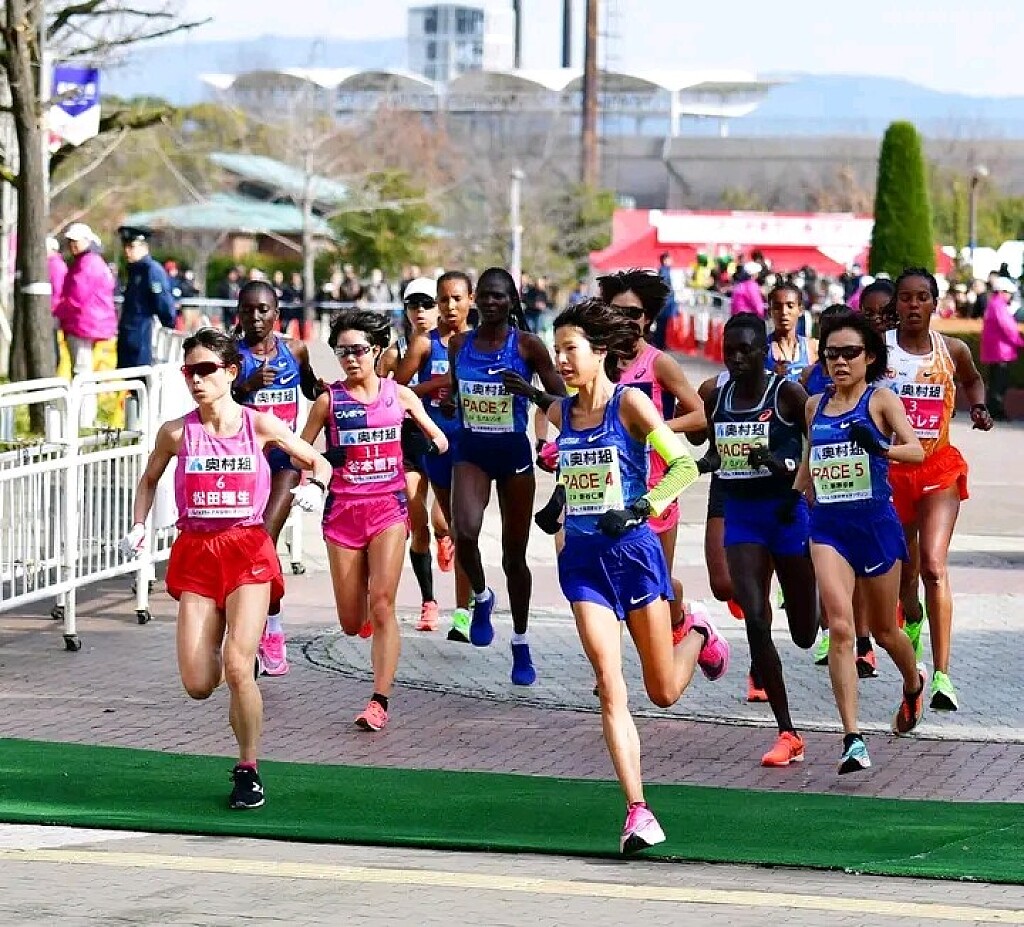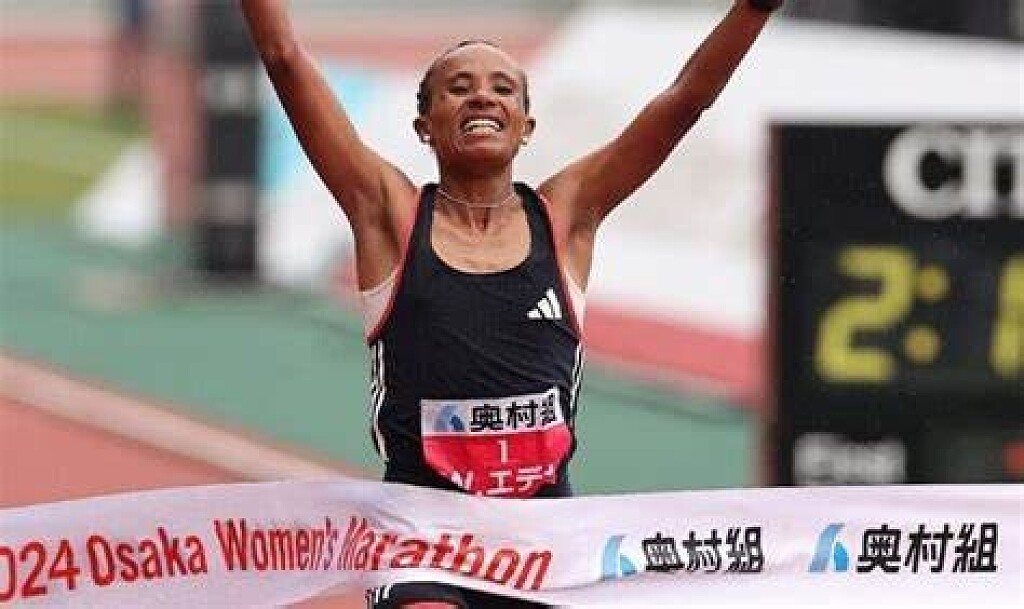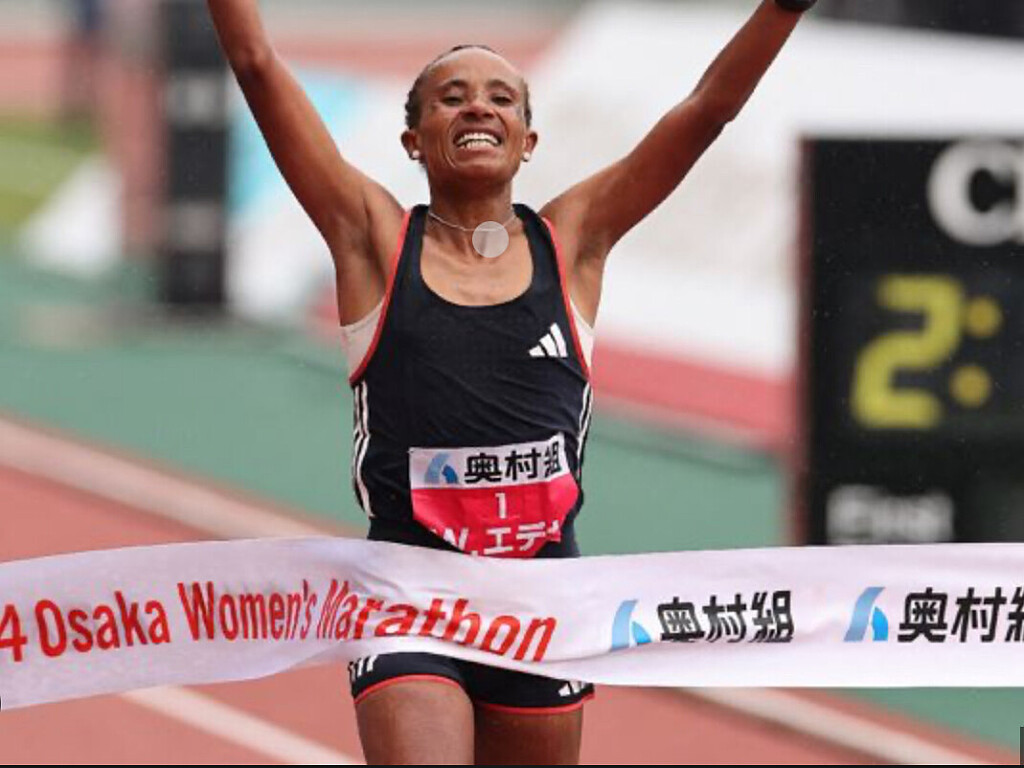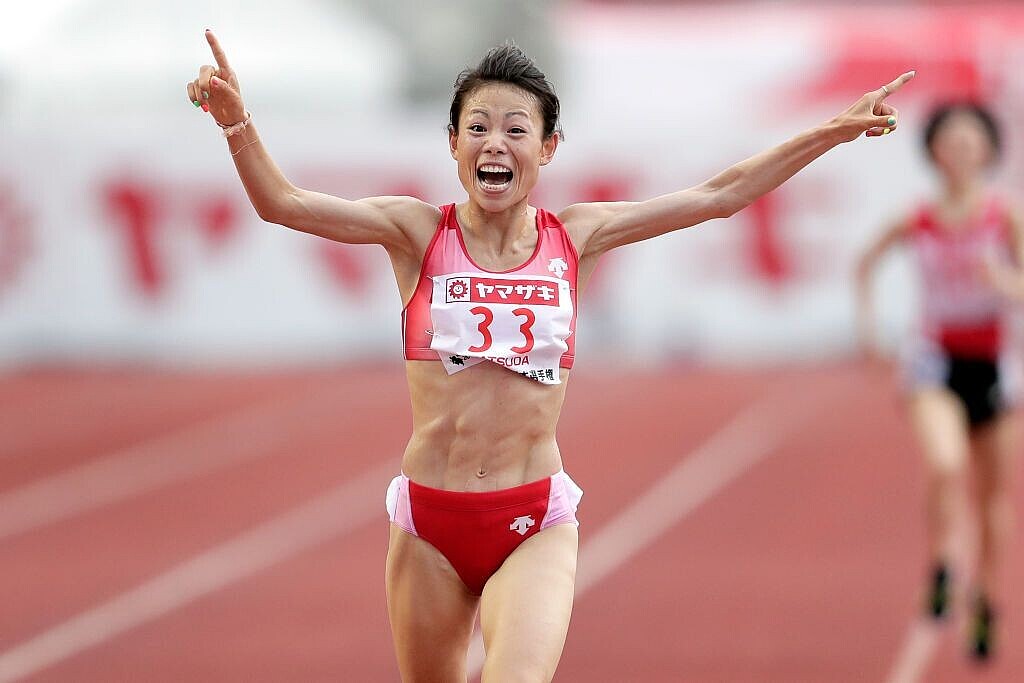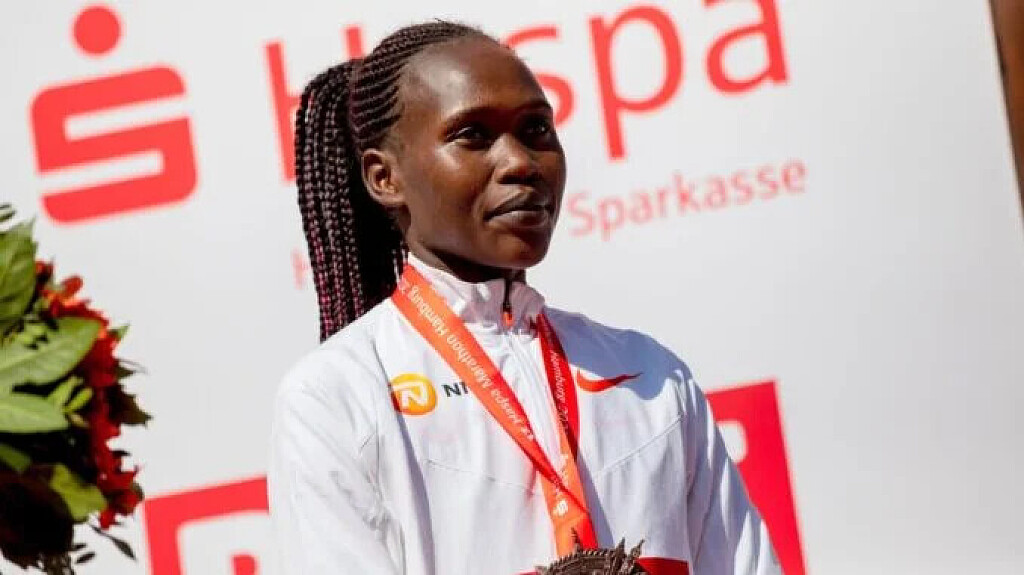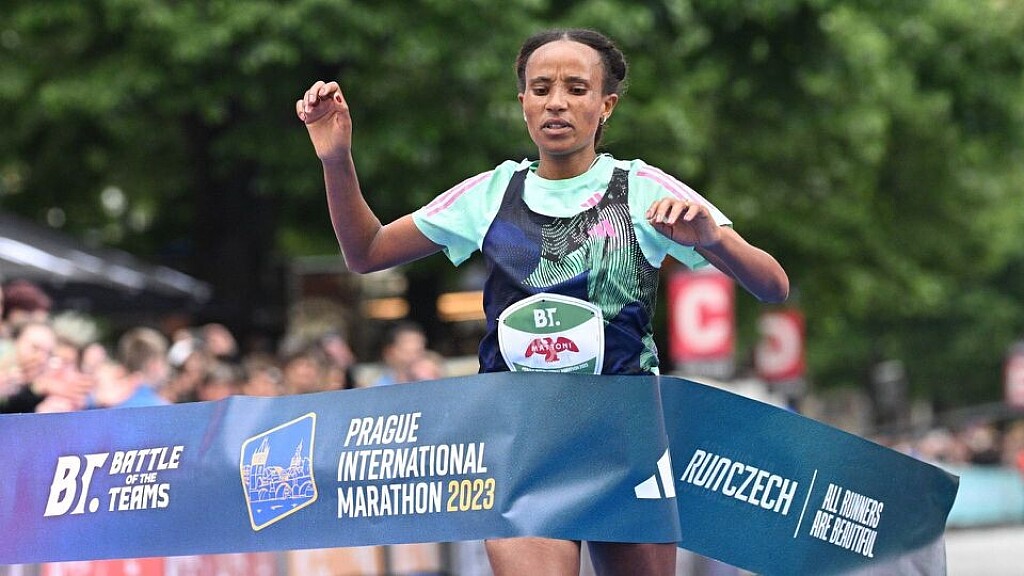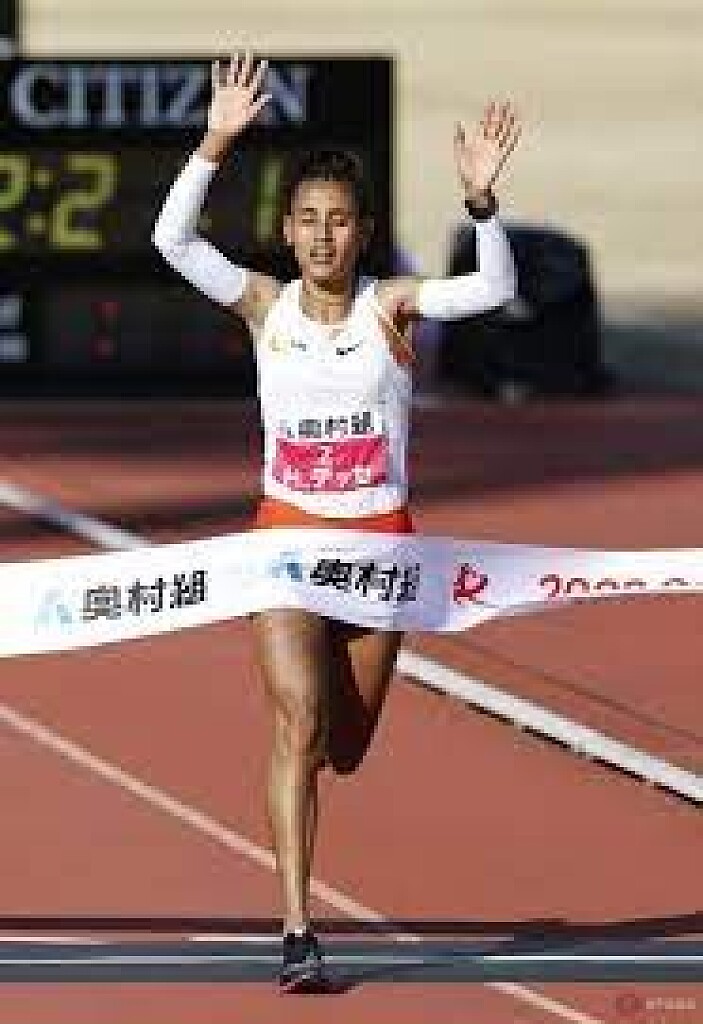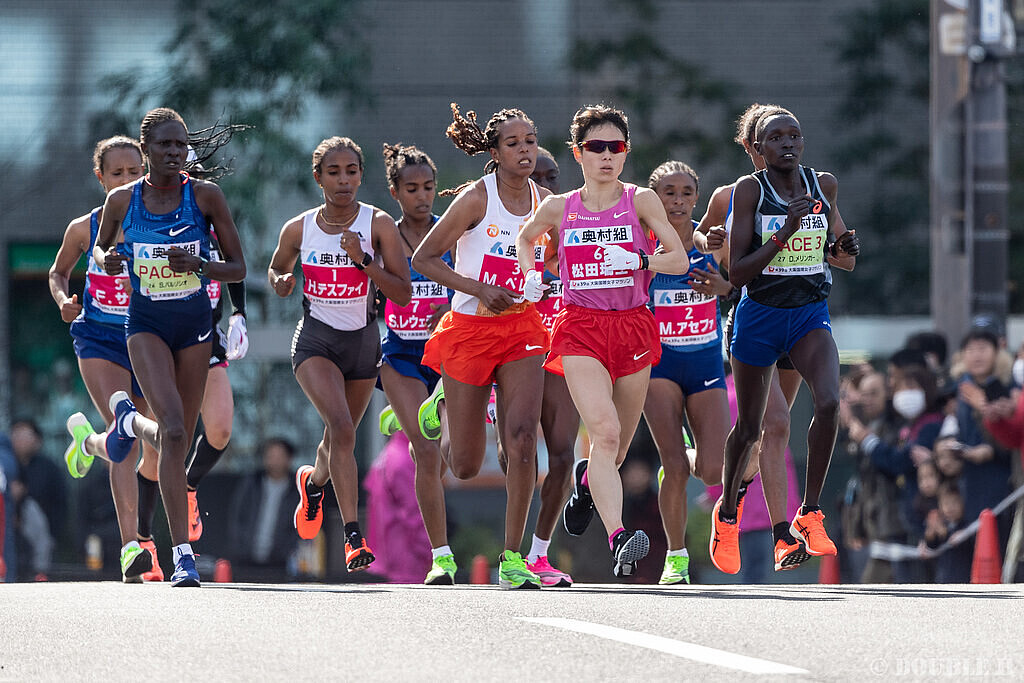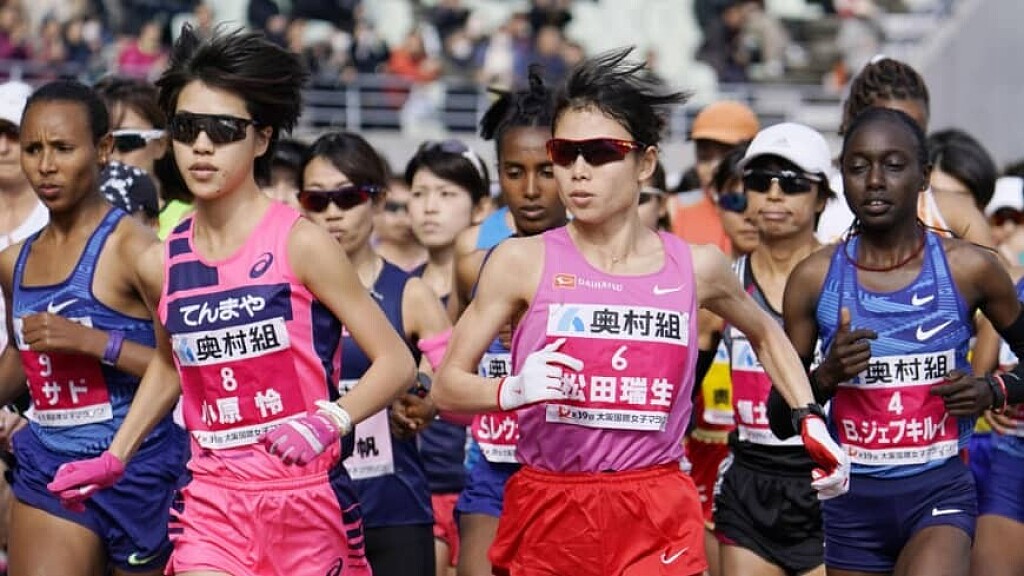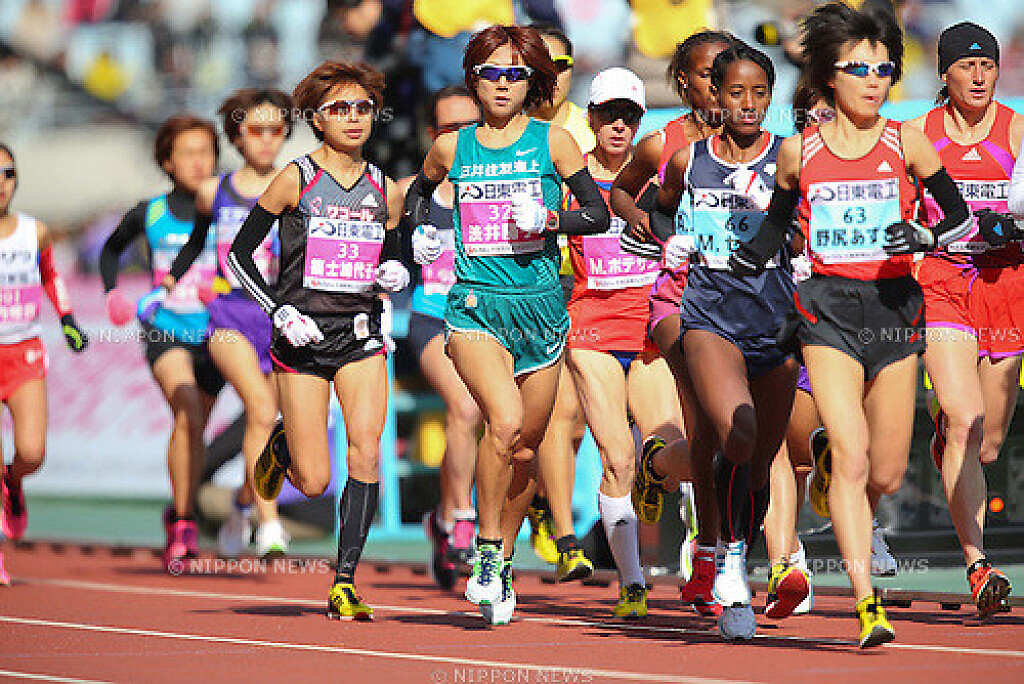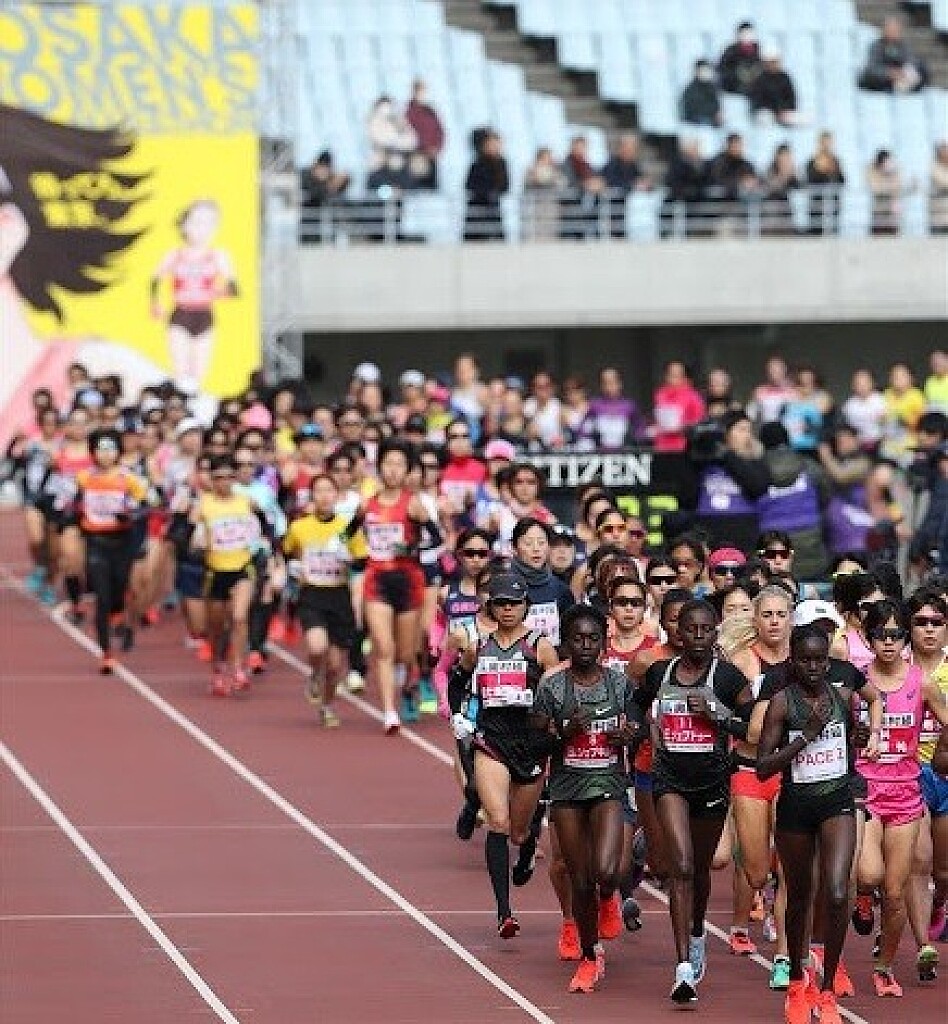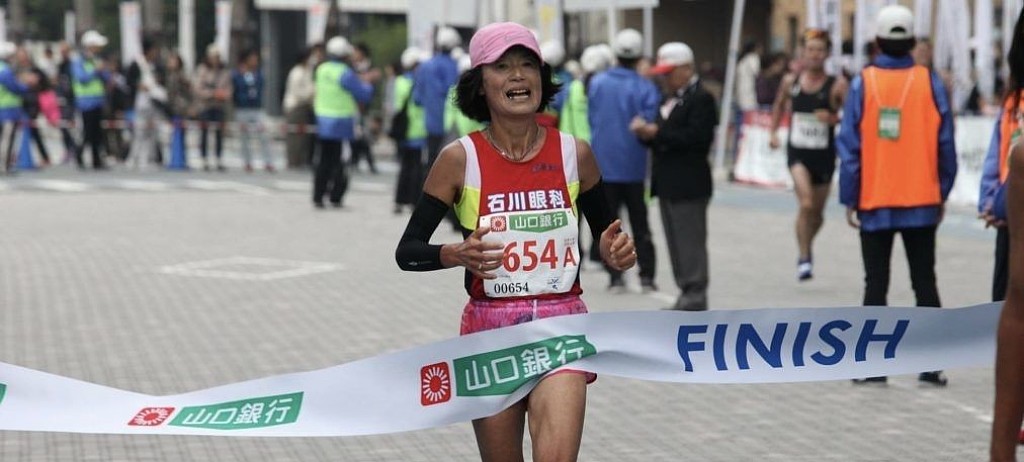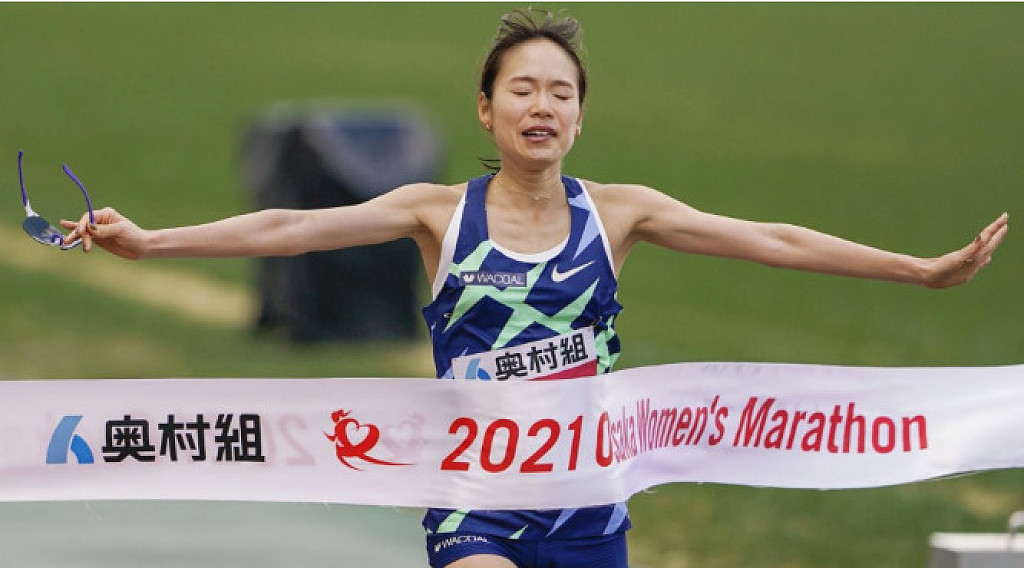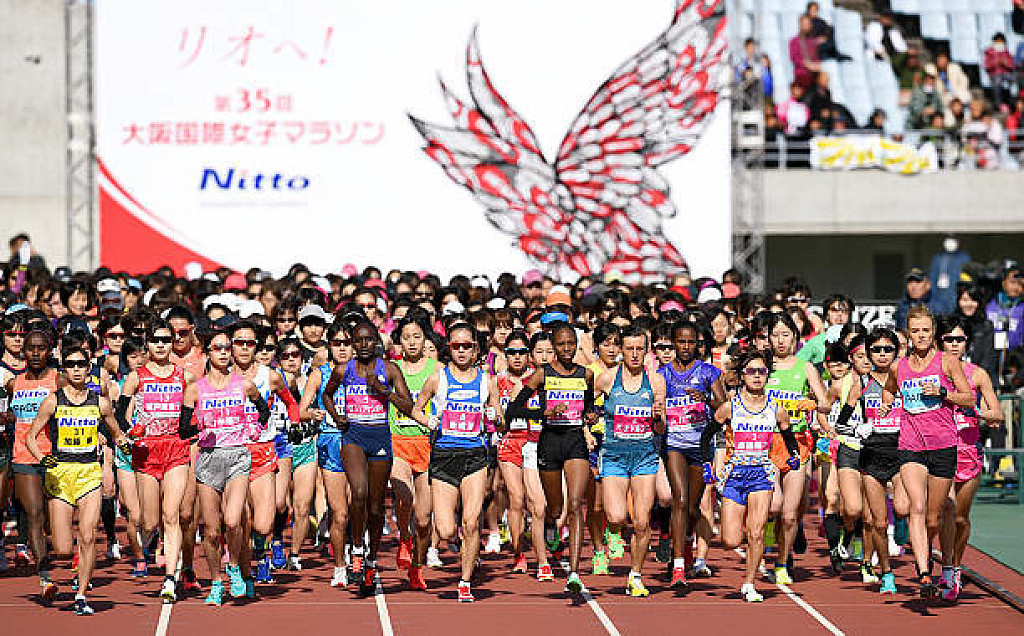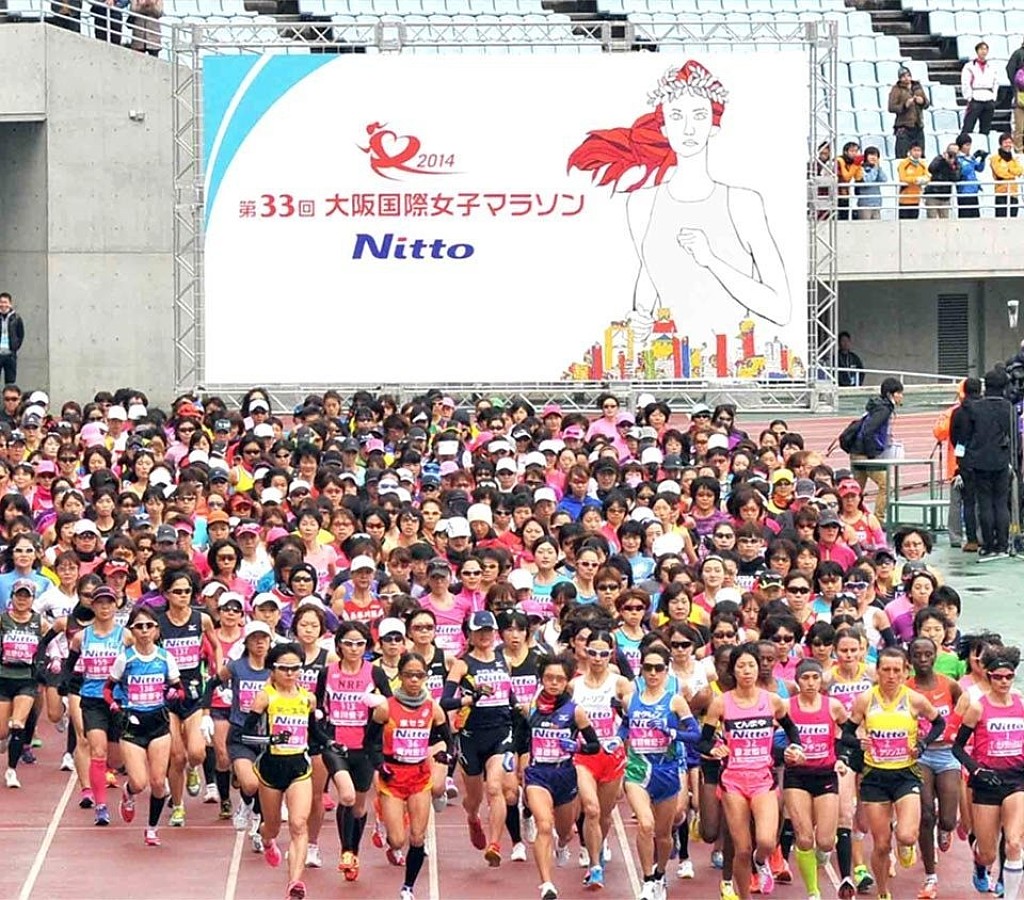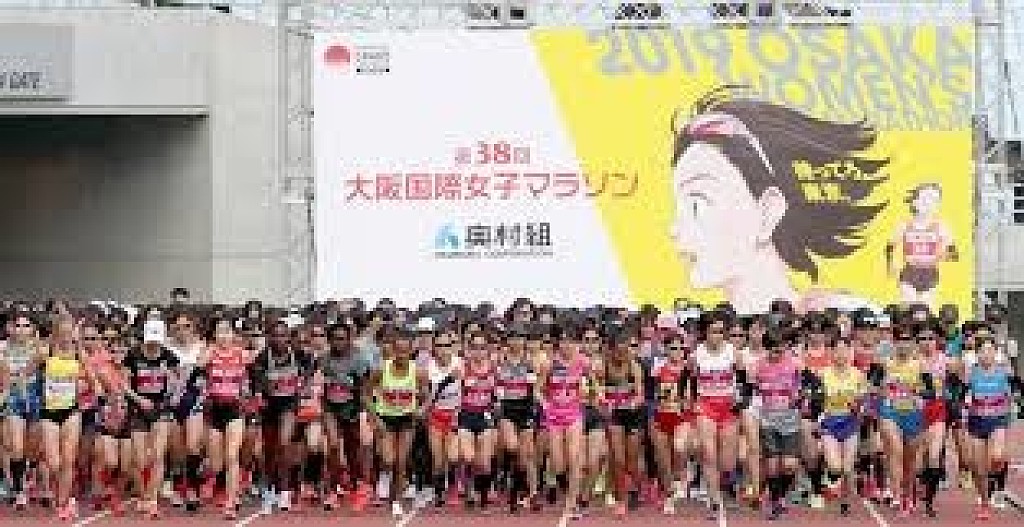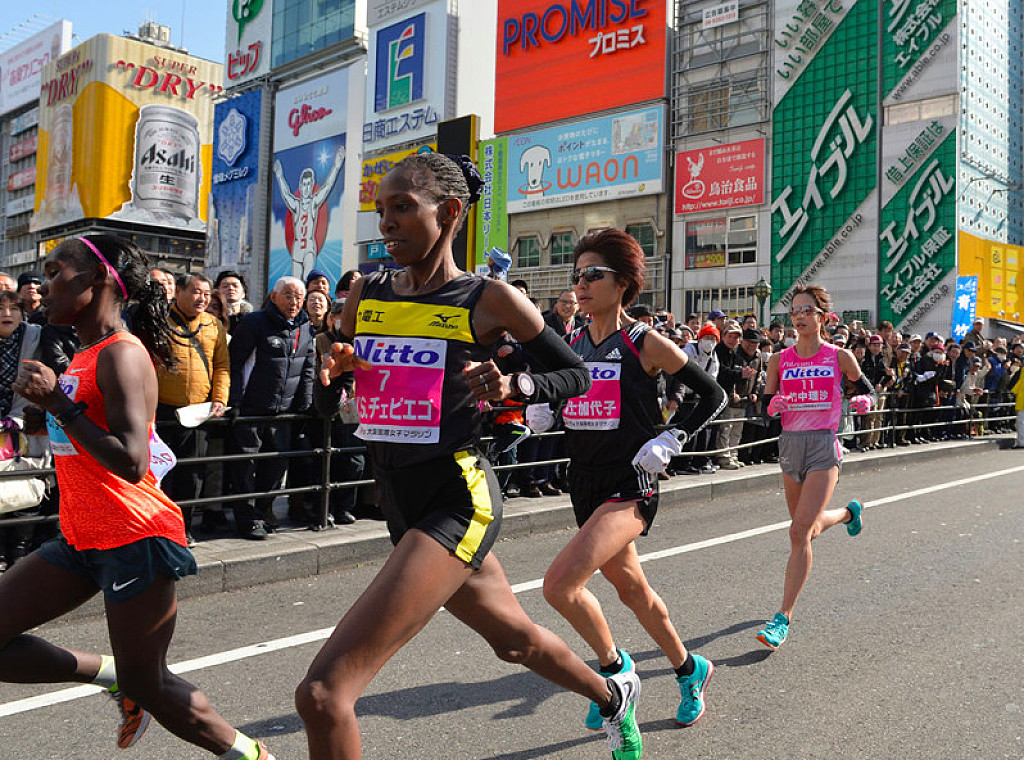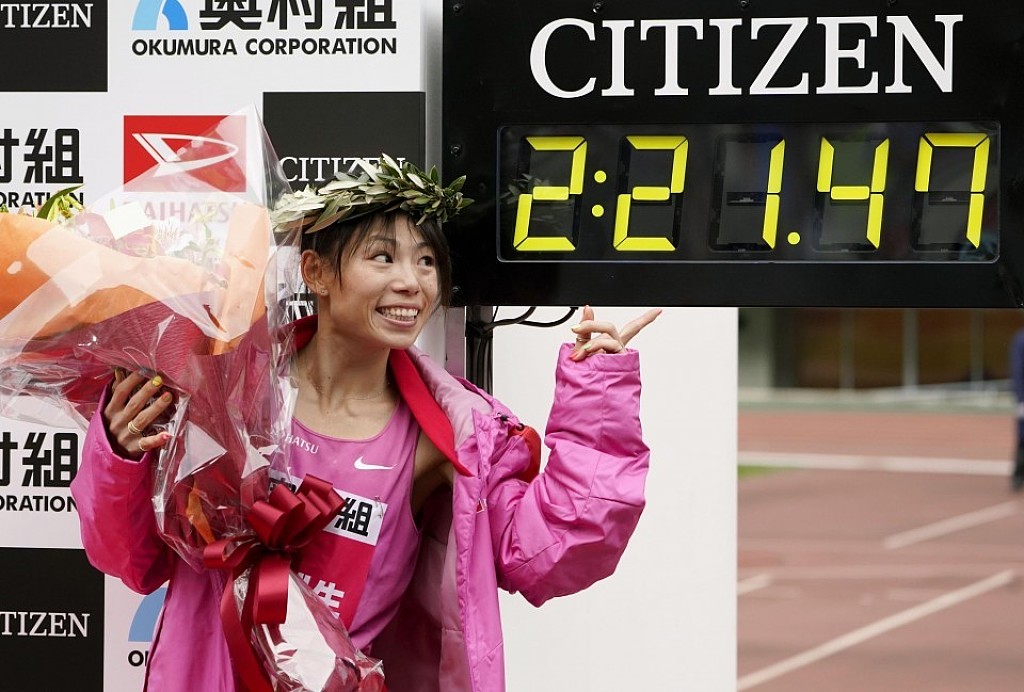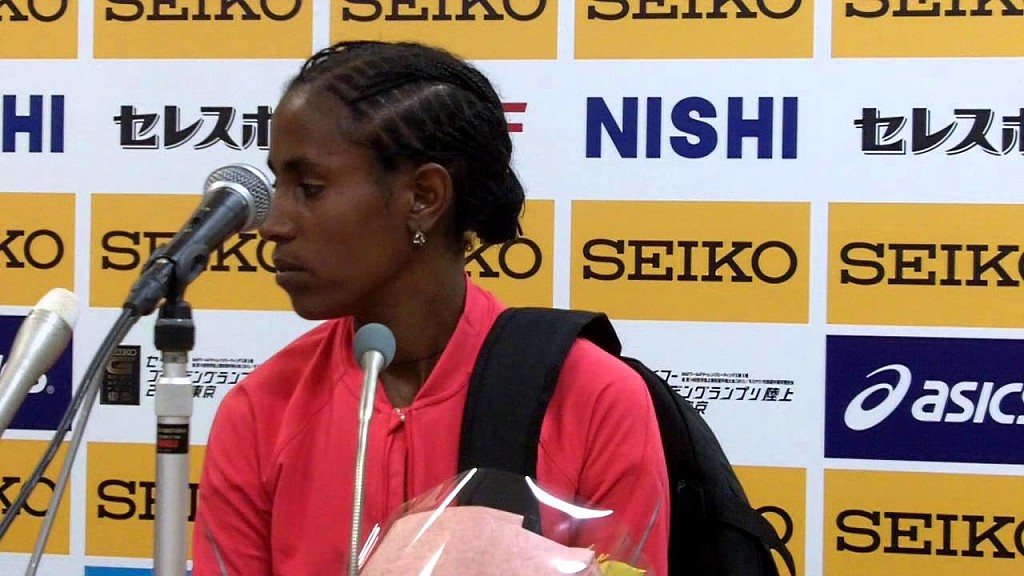Running News Daily
Running News Daily is edited by Bob Anderson. Send your news items to bob@mybestruns.com Advertising opportunities available. Train the Kenyan Way at KATA Kenya and Portugal owned and operated by Bob Anderson. Be sure to catch our movie A Long Run the movie KATA Running Camps and KATA Potato Farms - 31 now open in Kenya! https://kata.ke/
Index to Daily Posts · Sign Up For Updates · Run The World Feed
Crowned by the Streets of Osaka: Marathon Queens Clash for 2026 Glory
As dawn breaks over Osaka, the city will transform into a grand stage of endurance, elegance, and elite ambition. On Sunday, January 25, the 2026 Osaka Women’s Marathon returns with a promise that goes beyond distance — a promise of history, pride, and fierce competition among the world’s finest women marathoners.
The clock will strike 12:15 PM local time in Japan, while Africa awakens to the drama at 6:15 AM, and the Pacific coast watches under Saturday night lights. When the starting gun fires, all eyes will be fixed on the flowing rhythm of champions chasing both victory and legacy.
At the heart of this year’s spectacle stands Workenesh Edesa of Ethiopia, a runner already woven into Osaka folklore. Champion in 2024 and 2025, Edesa arrives seeking a rare and remarkable third consecutive title. Calm, composed, and devastatingly efficient, the 33-year-old brings with her a personal best of 2:17:55, set in Hamburg in 2025 — a statement of form that makes her the woman to beat once again.
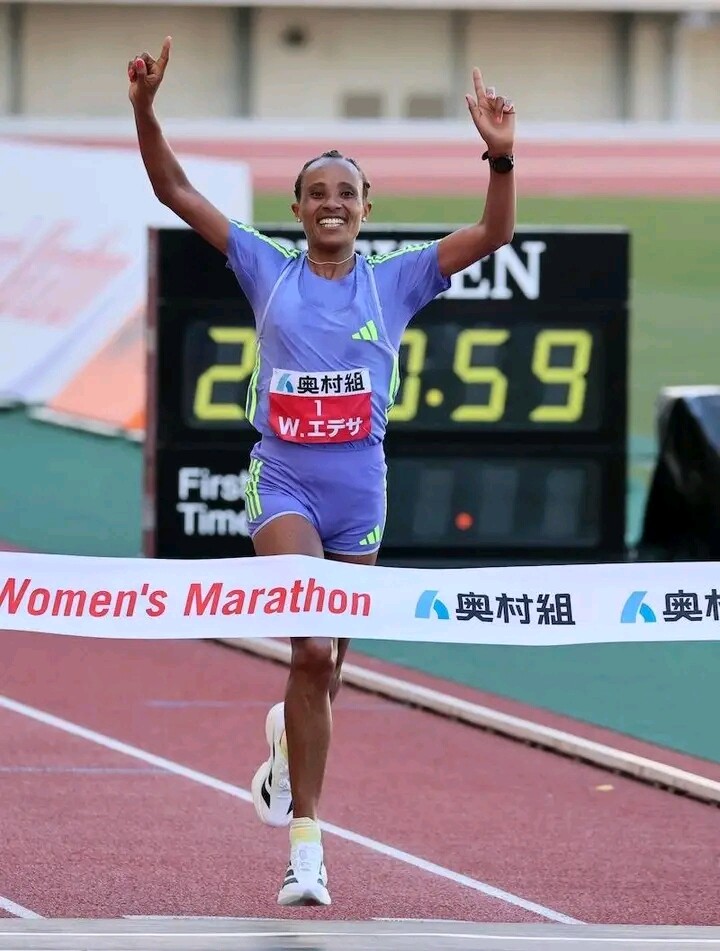
But history does not go unchallenged.
From Uganda, Stella Chesang steps onto the Osaka roads with quiet menace. At 29, she blends patience with explosive strength, owning a 2:18:26 personal best from Valencia. Her presence ensures that any moment of hesitation could be punished, and that the race will demand courage as much as conditioning.
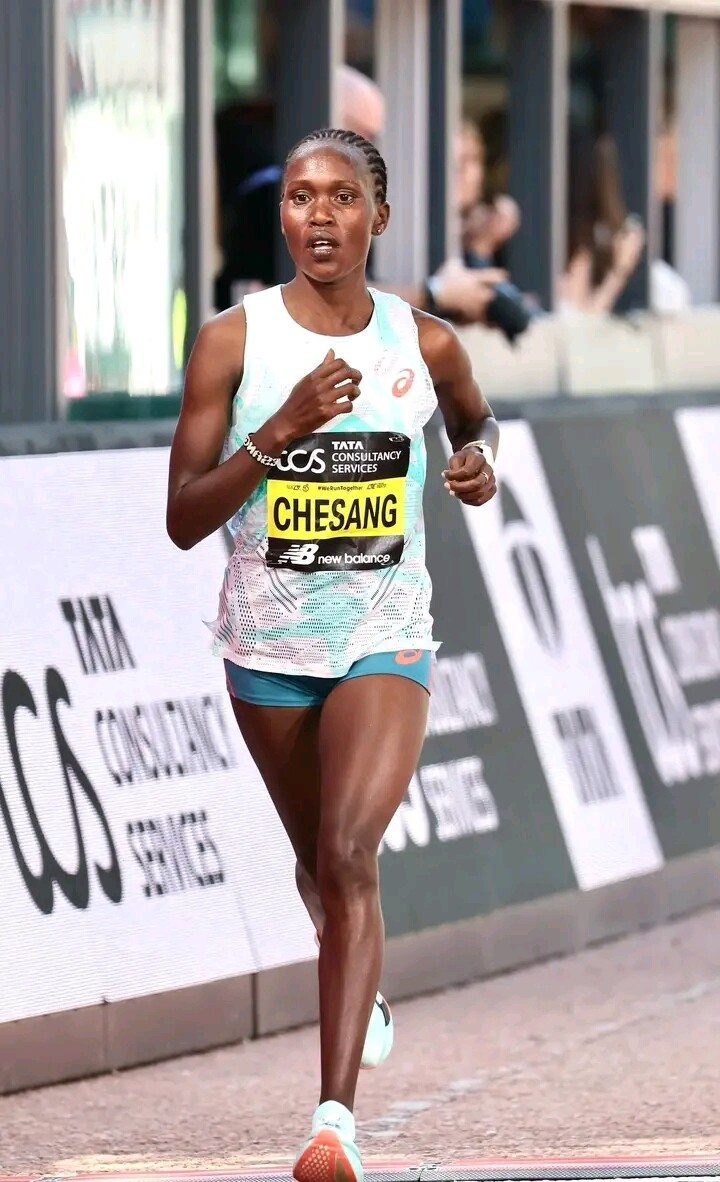
Completing the African trio is Ethiopia’s rising force, Bedatu Hirpa. At just 26, Hirpa represents the new generation — fearless, relentless, and hungry. Her 2:18:27 from Dubai signals readiness to step fully into the spotlight, and Osaka could be the stage where promise turns into authority.
Yet this marathon is not solely an African affair.
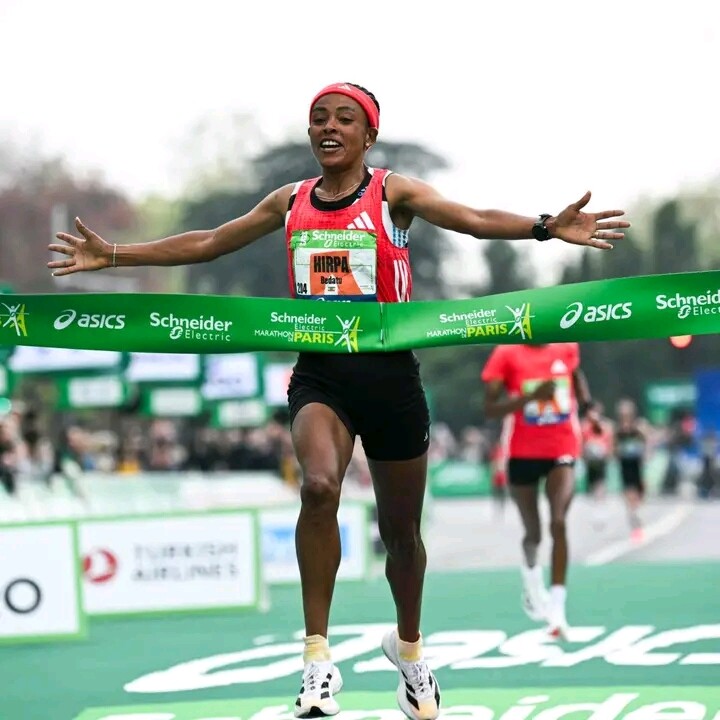
Japan answers with depth, discipline, and home-ground resolve. Mizuki Matsuda, racing for Osaka-based Daihatsu, leads the domestic charge. Her 2:20:42 from Berlin places her among Japan’s most reliable contenders, and the roar of local support may fuel something special. Alongside her, Mao Uesugi and Mizuki Nishimura embody consistency and youthful ambition, while veterans like Chiharu Suzuki, Madoka Nakano, and Nanaka Izawa bring experience carved from countless kilometers.
The Japanese lineup is rich in contrast — youth beside wisdom, patience beside boldness — each runner chasing her own definition of success on these familiar streets.
Osaka has always been more than a marathon course. It is a proving ground. A place where champions are tested not only by pace, but by pressure; not only by rivals, but by expectation. Every corner, every crowd, every silent stretch of road asks the same question: Who is ready to rule today?
On Sunday, the answer will be written step by step, breath by breath, across 42.195 unforgiving kilometers.
Three-time glory or a new queen’s coronation — Osaka is ready.
by Erick Cheruiyot for My Bestruns.
Login to leave a comment
Osaka International Womens Marathon
The Osaka International Ladies Marathon is an annual marathon road race for women over the classic distance of 42.195 kilometres which is held on the 4th or 5th Sunday of January in the city of Osaka, Japan, and hosted by Japan Association of Athletics Federations, Kansai Telecasting Corporation, the Sankei Shimbun, Sankei Sports, Radio Osaka and Osaka City. The first...
more...Osaka International Women's Marathon Elite Fields announced
The elite field for the Jan. 26 Osaka International Women's Marathon is out, and it's a really short list, especially given Osaka International's World Athletics platinum label status. There's last year's winner Workenesh Edesa, 3rd-placer Mizuki Matsuda, 7th-placer Natsumi Matsushita, 9th-placer Madoka Nakano and 12th-placer Kana Kobayashi, top Japanese Paris Olympic marathon placer Yuka Suzuki, veteran Kenyan-born Israeli Lonah Chemtai Salpeter, the debuting Nanaka Izawa, and that's about it.
Workenesh outran Honami Maeda last year, both going under 2:19 and Workenesh getting the win in 2:18:51. She has to be viewed as the favorite. Salpeter has run as fast as 2:17:45 before, but she hasn't run under 2:25 in the marathon or under 1:10 in the half marathon since 2022, so there's not much reason to think she's going to be competitive in a faster race here. Matsuda and Suzuki both ran PBs in their last marathons, Matsuda a 2:20:42 in Berlin this fall and Suzuki a 2:24:02 while finishing 6th in the Paris Olympics. Kobayashi and Izawa are interesting, Kobayashi having run 2:29:44 last year as a non-track team student at Waseda University and then winning Hofu at the beginning of December in a 2:24:59 CR, and Izawa fresh off a great 1:08:25 PB at the Sanyo Ladies Half Marathon this month.
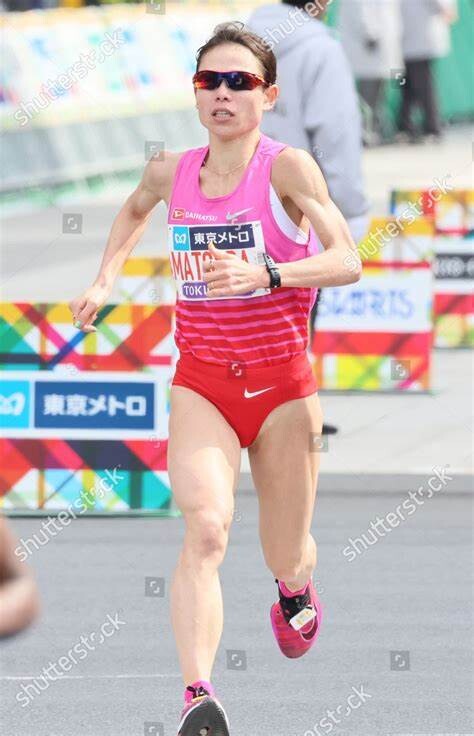
The Osaka Half Marathon is also happening in parallel with the marathon, and the fields there are decently competitive as always. Yuka Ando won the women's race in Osaka last year in a 1:08:18 PB and is back this time, facing sub-70 runner Sakiho Tsutsui, Mongolian NR holder Khishigsaikhan Galbadrakh and more. 1:00:41 Ethiopian Gebrie Erikhun leads a domestic men's field that includes Japan-based Patrick Mathenge Wambui and a million 61-minute Japanese men.
44th Osaka International Women's Marathon
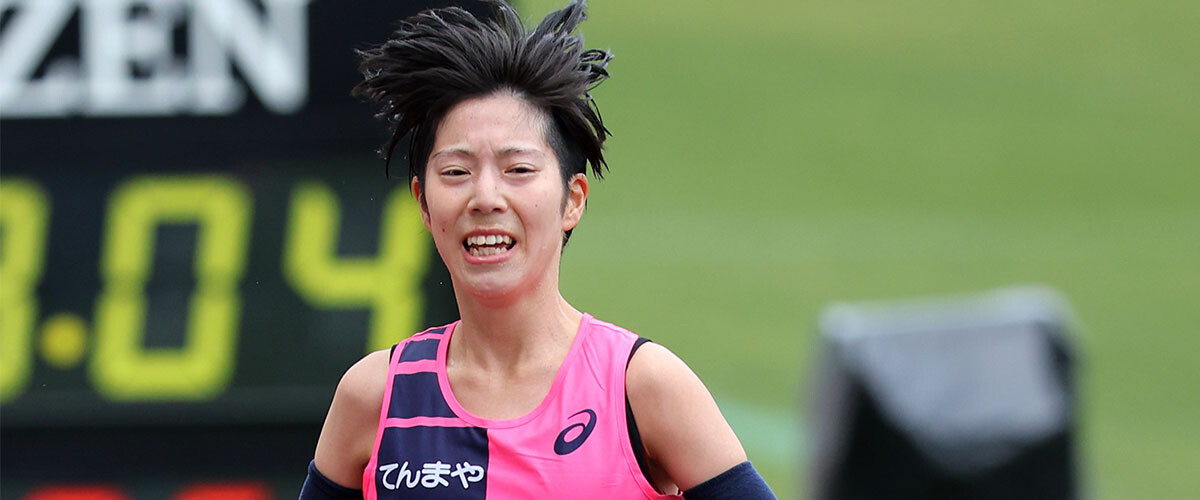
Elite Field Highlights
Lonah Chemtai Salpeter (Israel) - 2:18:45 (Nagoya 2022)
Workenesh Edesa (Ethiopia) - 2:18:51 (Osaka Women's 2024)
Mizuki Matsuda (Daihatsu) - 2:20:42 (Berlin 2024)
Natsumi Matsushita (Tenmaya) - 2:23:05 (Osaka Women's 2022)
Yuka Suzuki (Daiichi Seimei) - 2:24:02 (Paris Olympics 2024)
Kana Kobayashi (Otsuka Seiyaku) - 2:24:59 (Hofu 2024)
Yumi Yoshikawa (Chiba T&F Assoc.) - 2:25:20 (Osaka Women's 2023)
Chiharu Suzuki (Hitachi) - 2:25:59 (Osaka Women's 2023)
Madoka Nakano (Iwatani Sangyo) - 2:26:50 (Osaka Women's 2024)
Mao Kiyota (Suzuki) - 2:29:20 (Nagoya 2023)
Ayano Ikeuchi (Denso) - 2:32:26 (Seoul 2024)
Ayano Ikemitsu (Kagoshima Ginko) - 2:33:29 (Nagoya 2023)
Debut
Nanaka Izawa (Starts) - 1:08:25 (Sanyo Half 2024)
Rio Einaga (Osaka Gakuin Univ.) - 1:11:03 (National University Half 2023)
Kurumi Yoda (Osaka Gakuin Univ.) - 1:12:46 (Kansai University Half 2024)
Nanako Miwa (Kansai Gaikokugo Univ.) - 1:14:37 (Kansai University Half 2023)
by Brett Larner
Login to leave a comment
Osaka International Womens Marathon
The Osaka International Ladies Marathon is an annual marathon road race for women over the classic distance of 42.195 kilometres which is held on the 4th or 5th Sunday of January in the city of Osaka, Japan, and hosted by Japan Association of Athletics Federations, Kansai Telecasting Corporation, the Sankei Shimbun, Sankei Sports, Radio Osaka and Osaka City. The first...
more...Edesa smashes Osaka course record, Maeda breaks Asian record
Workenesh Edesa took more than two minutes off the Osaka Women’s Marathon course record, winning the World Athletics Platinum Label road race in an equal PB of 2:18:51 on Sunday (28).
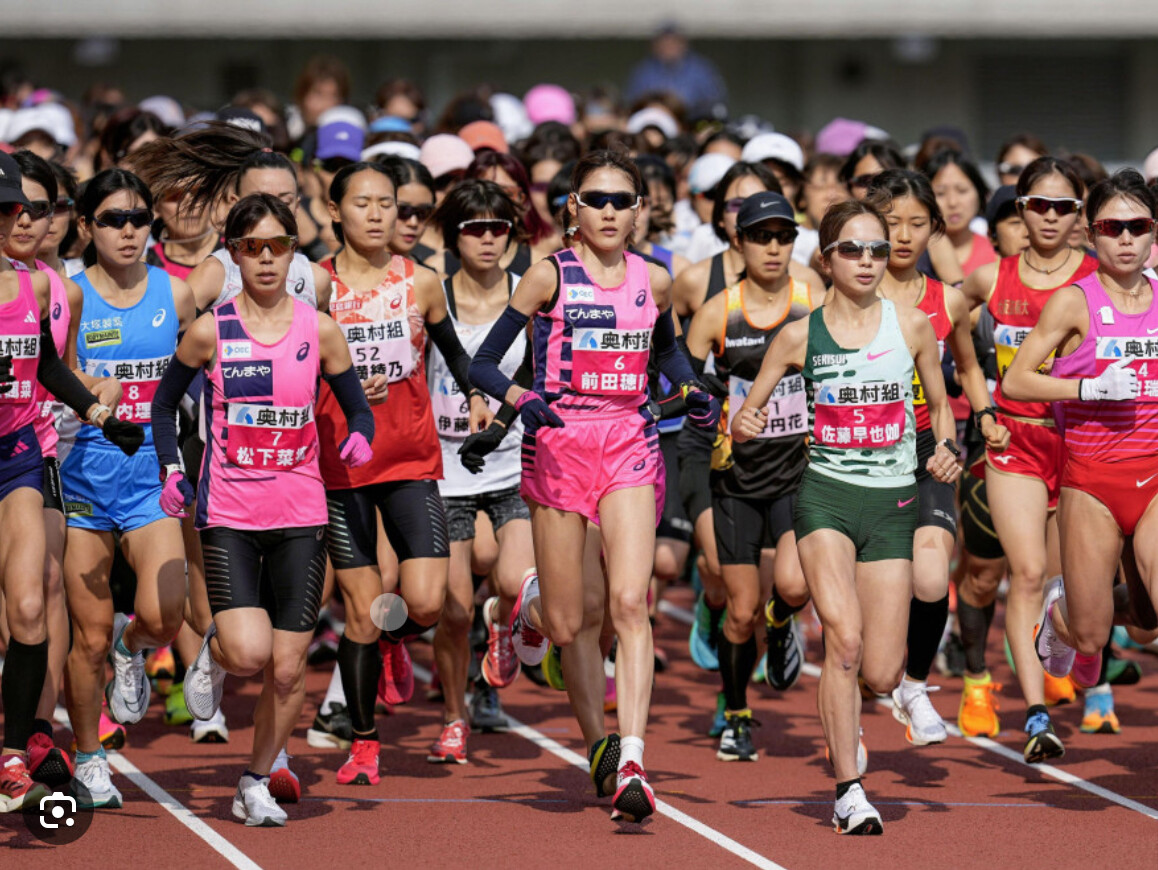
In a close race, the Ethiopian won by just eight seconds from long-time leader Honami Maeda of Japan, who clocked an Asian record of 2:18:59. Her time also puts her in a strong position to claim a spot on Japan’s team for the Paris Olympics later this year.
Five women – Edesa, Maeda, three-time winner Mizuki Matsuda, Ugandan record-holder Stella Chesang and Sayaka Sato – ran together for the first half, passing through 5km in 16:32 and 10km in 32:59. By the time they reached half way in 1:09:46 – comfortably on schedule to break Matsuda’s course record of 2:20:52 – they had a lead of more than two minutes on the chase pack.
Maeda tried to push on in the second half and the lead pack soon became strung out, Matsuda being one of the first to fall behind. Maeda built up a five-second lead over Edesa at 30km, passing through that checkpoint in 1:38:36, while Chesang was further back in third, a few seconds ahead of Sato.
But after another kilometre, Edesa caught up with Maeda and the Ethiopian gradually built up an 11-second lead by 35km (1:54:46). Maeda refused to let Edesa get out of her sights, though. Chesang appeared to have a comfortable 24-second lead over Sato at this point, while Matsuda was a distant fifth, two minutes behind the leader.
Edesa held on to her lead through to the finish with Maeda chasing hard behind. Edesa crossed the line in 2:18:51, with Maeda taking second in 2:18:59, taking 13 seconds off the Japanese and Asian record set in 2005 by 2004 Olympic champion Mizuki Noguchi. But the real drama was unfolding behind as Matsuda passed Sato and then Chesang to make her way into third spot, crossing the line in 2:23:07. Chesang took fourth (2:23:36), more than a minute ahead of Sato. Germany’s Katharina Steinruck – daughter of three-time Osaka winner Katrin Dorre-Heinig – was sixth in a PB of 2:24:56.
“My goal was to break the course record,” said Edesa, who now shifts her attention to success at the Boston Marathon in a few months’ time.
Maeda, whose previous PB was 2:22:32, also admitted she had records on her mind leading up to today’s race. “In the later part of the race, I wasn’t sure if I could accomplish my goal because the wind and rain hit me in the final stages.”
Login to leave a comment
Japan´s Mizuki Matsuda is aiming to become the first four-time winner at the Osaka Women’s Marathon
Course record-holder Mizuki Matsuda is aiming to become the first four-time winner at the Osaka Women’s Marathon, but the Japanese runner will face stiff opposition at the World Athletics Platinum Label road race on Sunday (28).
Matsuda is one of three women to have won in Osaka three times, her latest victory coming just two years ago in a PB and course record of 2:20:52. Her last race was five months ago at the World Championships in Budapest, where she finished 13th.
She didn’t compete at the Marathon Grand Championships in October, Japan’s main selection race for the Olympic Games. But the top-placed Japanese runner in Osaka could potentially bump off the provisional third team member, Ai Hosoda, if they run faster than 2:21:42 – Hosoda’s best clocking within the qualifying window. The Nagoya Marathon in March will be the final opportunity for Japanese runners to claim an Olympic berth.
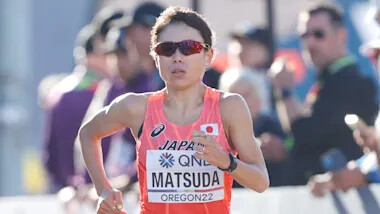
Matsuda’s motivation will be high, but she’ll face three formidable opponents from overseas.
Workenesh Edesa is the fastest in the field, boasting a PB of 2:18:51 from the 2022 Berlin Marathon. She has finished on the podium in 10 of her 15 career marathons, and she has bettered 2:21 in her past four races over the classic distance. Last year she won in Prague, then went on to clock 2:19:40 in Berlin.

Uganda’s Stella Chesang could be something of an underdog. The 2018 Commonwealth 10,000m champion has only contested one marathon to date, but she clocked a national record of 2:20:23 to finish third in Hamburg.
Edesa’s fellow Ethiopian Meseret Gola will also be highly motivated on Sunday, having finished second last year. In fact, she has finished runner-up in six of her 10 most recent marathons – including at the 2022 Seville Marathon, where she set her PB of 2:20:50 – so will be keen to claim the top spot of the podium.
Matsuda won’t be the only Japanese runner vying for a last-minute call-up to the Olympic team. Sayaka Sato represented Japan at last year’s World Championships in Budapest, following a 2:22:13 PB run in Berlin in 2022. Honami Maeda won the Marathon Grand Championships ahead of the Tokyo Olympics but finished seventh at the latest edition in October. Natsumi Matsushita, meanwhile, finished fifth in that race and will be hopeful of showing improved form on Sunday.
Leading elite entries
Workenesh Edesa (ETH) 2:18:51
Stella Chesang (UGA) 2:20:23
Sisay Meseret Gola (ETH) 2:20:50
Mizuki Matsuda (JPN) 2:20:52
Sayaka Sato (JPN) 2:22:13
Honami Maeda (JPN) 2:22:32
Natsumi Matsushita (JPN) 2:23:05
Rie Kawauchi (JPN) 2:25:35
Ayano Ikemitsu (JPN) 2:26:07
Yuna Daito (JPN) 2:26:09
Daeun Jeong (KOR) 2:28:32
Kaena Takeyama (JPN) 2:29:20
Militsa Mircheva (BUL) 2:29:23
by World Athletics
Login to leave a comment
Osaka International Womens Marathon
The Osaka International Ladies Marathon is an annual marathon road race for women over the classic distance of 42.195 kilometres which is held on the 4th or 5th Sunday of January in the city of Osaka, Japan, and hosted by Japan Association of Athletics Federations, Kansai Telecasting Corporation, the Sankei Shimbun, Sankei Sports, Radio Osaka and Osaka City. The first...
more...Ugandan Stella Chesang headlines Osaka Women’s Marathon
The 2018 Commonwealth Games 10,000m champion, Stella Chesang will be the lady to watch at the 43rd edition of the Osaka Women’s Marathon slated for this Sunday (28) in Osaka, Japan.
The 27 year-old who is also the 2015 World U20 5000m bronze medallist, comes to this race with a life time best of 2:20.23 that she got last year at the Haspa Marathon where she took the bronze medal.
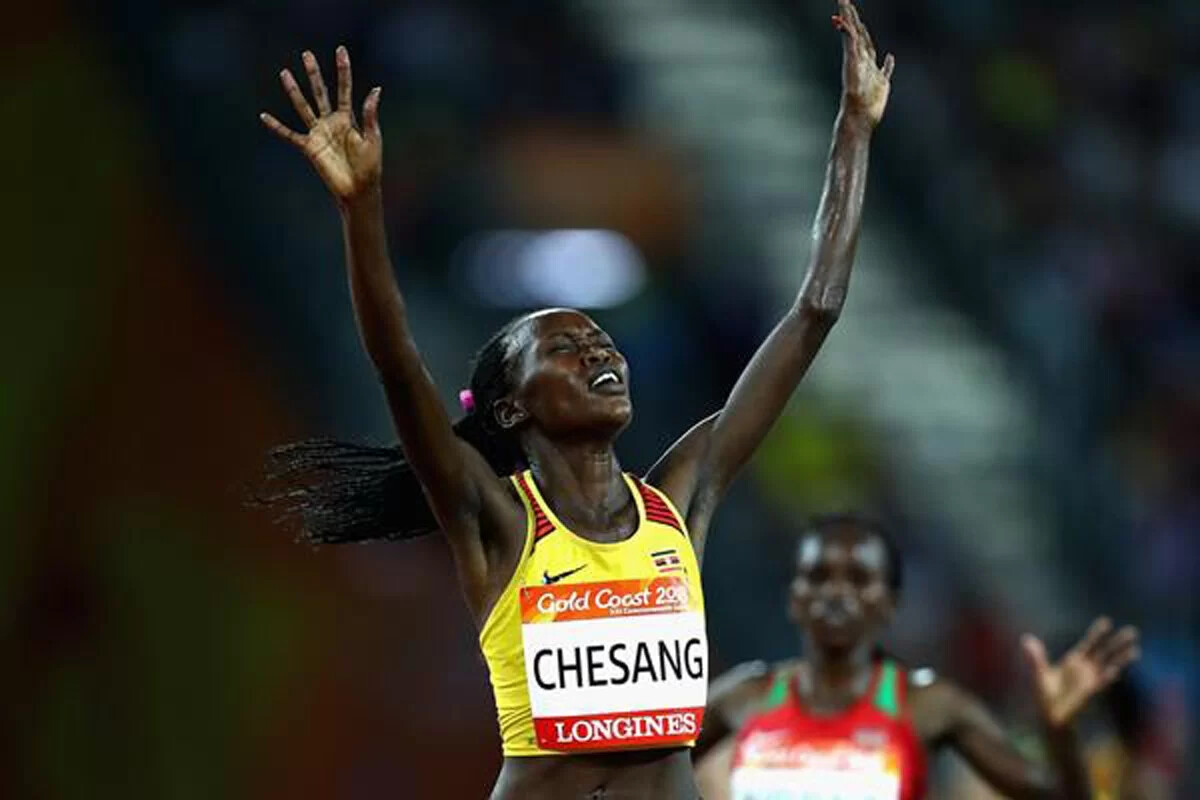
Chesang will not have an easy ride as she will have to get past Workenesh Edesa of Ethiopia, who is the fastest athlete on paper with a time of 2:18.51 that she set two years ago at the Berlin Marathon, where she finished in fourth place. Edesa who is the oldest athlete on the elite list is also the reigning Prague Marathon champion and will steer the ship alongside her compatriot Sisay Meseret Gola, who is the youngest athlete among the elite and holds the third fastest time of 2:20.50 that she got at the 2022 Zurich Marathon where she took the silver medal.
The three athletes will battle with the race defending champion and course record holder, Matsuda Mizuki, who is also the 2017 Asian Games 10,000m bronze medallist and comes to this race with a personal best of 2:20.52 that she got last year at this event. The 28 year-old will partner with her six compatriots as they seek to retain the title.
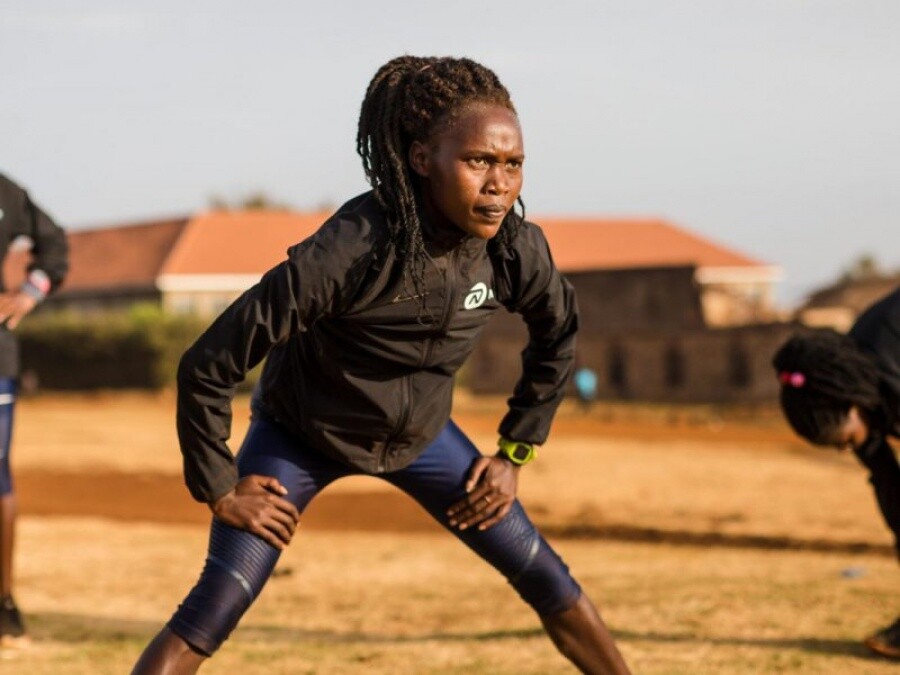
Japan’s Sato Sayaka of 2:22.13 will tag along Maeda Honami of 2:22.32, Matsushita Natsumi 2:23.05, Kawauchi Rie 2:25.35, Daito Yuna 2:26.09, Takeyama Kaena 2:29.20 as they also fight for the top position.
LEADING TIME
42KM WOMEN
Stella Chesang (UGA) 2:20.23
Workenesh Edesa (ETH) 2:18.51
Sisay Meseret Gola (ETH) 2:20.50
Matsuda Mizuki (JPN) 2:2052
Sato Sayaka (JPN) 2:22.13
Maeda Honami (JPN) 2:22.32
by John Vaselyne
Login to leave a comment
Osaka International Womens Marathon
The Osaka International Ladies Marathon is an annual marathon road race for women over the classic distance of 42.195 kilometres which is held on the 4th or 5th Sunday of January in the city of Osaka, Japan, and hosted by Japan Association of Athletics Federations, Kansai Telecasting Corporation, the Sankei Shimbun, Sankei Sports, Radio Osaka and Osaka City. The first...
more...No Kenyans have been invited to the Osaka Women's marathon elite field
The race organizers have announced the elite fields for the Osaka Women's Marathon.
The Osaka Women’s Marathon race organizers have announced the elite field for the event scheduled for Sunday January 28, 2024 and surprisingly no Kenyan has been invited.
Ethiopia’s Workenesh Edesa headlines the field with a Personal Best time of 22:18:51. The Ethiopian has enjoyed a great 2023 season that saw her finish among the top 10 in all her three marathons.
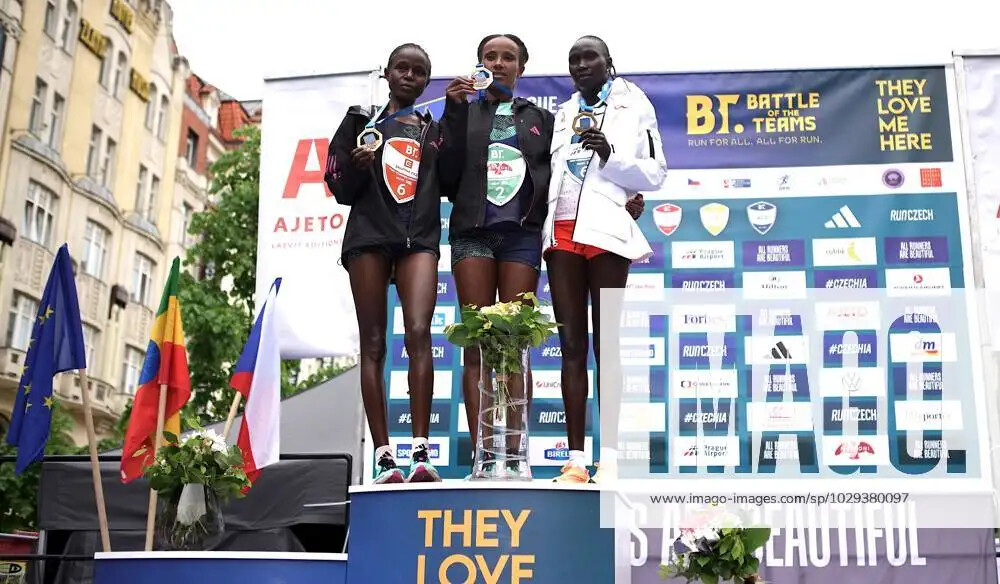
She opened her campaign with a fourth-place finish at the Tokyo Marathon before dominating at the Prague Marathon, taking top honours.
The 31-year-old then completed her season with a seventh-place finish at the Berlin Marathon in September.
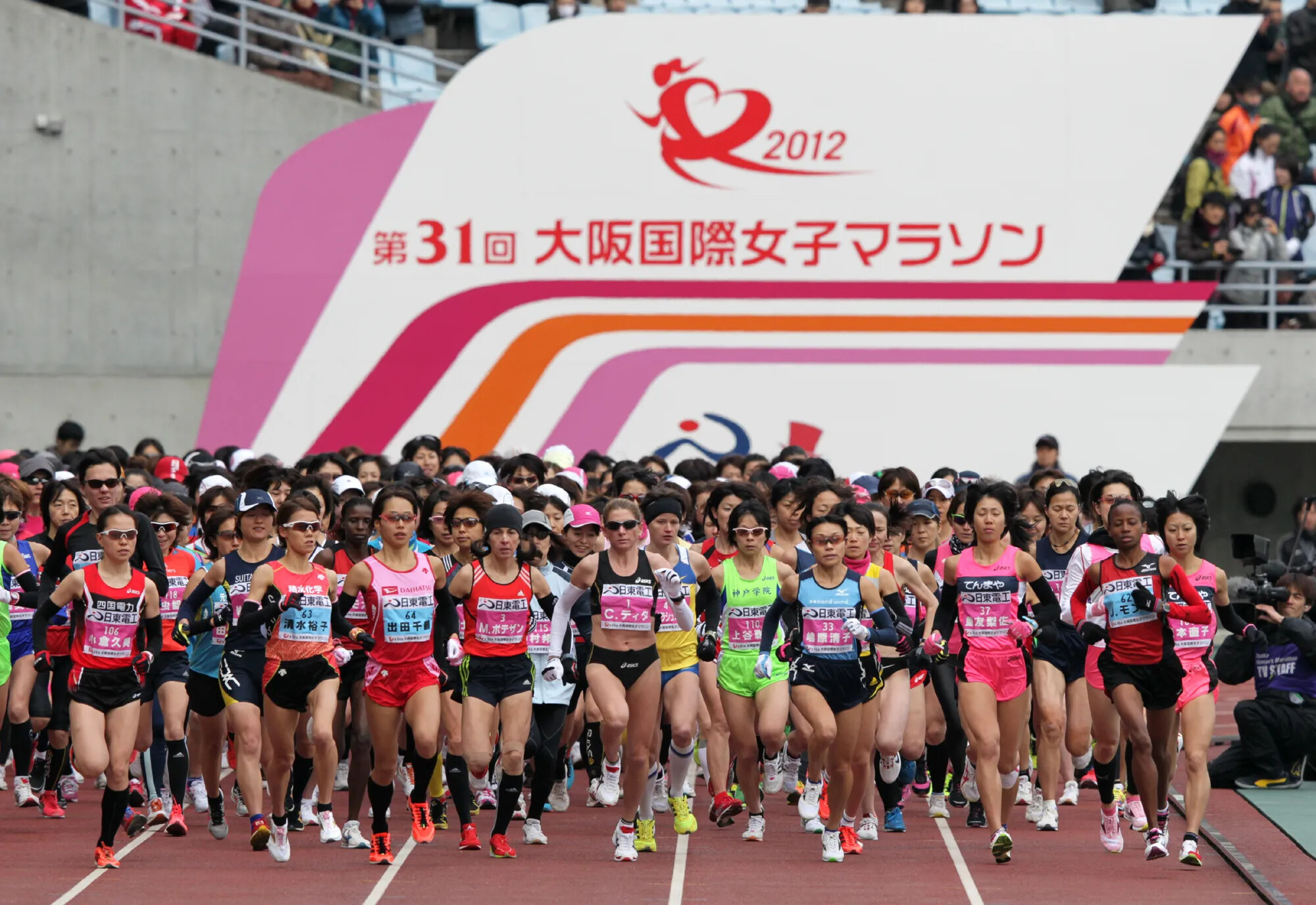
She will be joined by compatriot Meseret Gola, the third-fastest athlete in the field, who will be vying for a place on the podium too. Gola returns to the familiar course after her second-place finish during this year’s edition of the race.
The 25-year-old also finished seventh at the Amsterdam Marathon back in October to end her season.
Uganda’s Stella Chesang has also been invited and she will be keen to make an impression in what will be her second marathon in her career.
The Ugandan made her marathon debut at the Haspa Marathon and finished an impressive third. She will be hoping to build on that as she heads to Japan. The time she clocked qualifies her to be the second-fastest in the field.
Home talent will be led by Mizuki Matsuda, who will be joined by compatriots Sayaka Sato, Honami Maeda, and Rie Kawauchi among other runners.
by Abigael Wuafula
Login to leave a comment
Osaka International Womens Marathon
The Osaka International Ladies Marathon is an annual marathon road race for women over the classic distance of 42.195 kilometres which is held on the 4th or 5th Sunday of January in the city of Osaka, Japan, and hosted by Japan Association of Athletics Federations, Kansai Telecasting Corporation, the Sankei Shimbun, Sankei Sports, Radio Osaka and Osaka City. The first...
more...Hailu wins Osaka Women's Marathon
Ethiopia’s Haven Hailu returned to winning ways to triumph at the Osaka Women’s Marathon, this year’s first World Athletics Platinum Label road race, on Sunday (29).
The 24-year-old led an Ethiopian top two, clocking 2:21:13 to win by almost a minute ahead of Meseret Gola (2:22:12). Japan’s Yuka Ando finished third in 2:22:59.
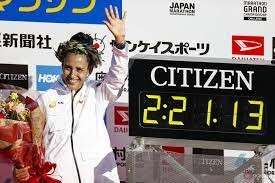
The event, which started at the Nagai Stadium practice track, immediately turned into a race of attrition. At 1km the lead pack featured Hailu, Gola and Kenya’s Maurine Chepkemoi together with Japan’s Ando, Sayaka Sato, Mao Uesugi and Reia Iwade behind the three pacemakers.
Sato clashed with Iwade and fell after 7km, immediately losing ground on the lead group. She would eventually drop out at 18km, when her coach came out to the course to stop her.
The leaders reached 10km in 32:56 and Iwade lost touch with the pack a short while later.
Uesugi started to drift back at 19km, the chase group eventually catching her and they ran together for the rest of the race.
The second of the pacemakers dropped out at 20km, reached in 1:06:00, and at this stage it was Chepkemoi who was struggling to keep pace.
By the half way point, passed by the leaders in 1:09:45, Chepkemoi was 10 seconds behind and she dropped out after 25km.
Hailu, Gola and Ando forged on when the last pacemaker left the race at 30km, reached in 1:39:34. It was at this point that Hailu made her move, covering the next kilometre in 3:05. Gola was able to stay with Hailu, but Ando fell behind.
Gola couldn’t stick with that pace for long, though, and by 35km Hailu had built a 13-second lead.
She only increased the gap and eventually won by 59 seconds, Gola holding on to second place and Ando finishing third, feeling frustrated as she failed to improve her 2:21:36 PB from Nagoya in 2017.
Hailu, who was unable to finish her last marathon in Chicago in October, adds this latest win to her victory in Rotterdam last April.
Behind the top trio, the chase group had reduced to Uesugi, debutante Yumi Yoshikawa and Sairi Maeda with 5km to go. Uesugi had the strongest finish and held off Yoshikawa by two seconds, 2:25:18 to 2:25:20, with Maeda finishing a further four seconds back in her first marathon since 2019 and following maternity leave.
The race was an opportunity for Japan’s leading contenders to qualify for the Marathon Grand Championship – Japan’s Olympic trial race – in October. Ando and Uesugi had already qualified, and Yoshikawa, Maeda, Chiharu Ikeda and Yuna Daito joined them in achieving the feat in Osaka, Ikeda finishing the race in seventh place in 2:25:59 and Daito running 2:26:09 to place eighth.
by Ken Nakamura World Athletics
Login to leave a comment
Osaka International Womens Marathon
The Osaka International Ladies Marathon is an annual marathon road race for women over the classic distance of 42.195 kilometres which is held on the 4th or 5th Sunday of January in the city of Osaka, Japan, and hosted by Japan Association of Athletics Federations, Kansai Telecasting Corporation, the Sankei Shimbun, Sankei Sports, Radio Osaka and Osaka City. The first...
more...Osaka Women’s Marathon set to crown new champion
A new name will be added to the Osaka Women’s Marathon list of winners on Sunday (29) as none of the past champions will be in attendance at the World Athletics Platinum Label road race.
Japanese women have dominated the race in recent years, winning six of the past seven editions. But the presence of Maurine Chepkemoi, Haven Hailu and Meseret Gola means there’s a high probability of an overseas visitor winning this year’s race.
Chepkemoi and Hailu have raced before, at the 2021 Amsterdam Marathon, where both women set their lifetime bests. Kenya’s Chepkemoi finished just one second ahead of Hailu on that occasion, 2:20:18 to 2:20:19, so the Ethiopian will he highly motivated for revenge.
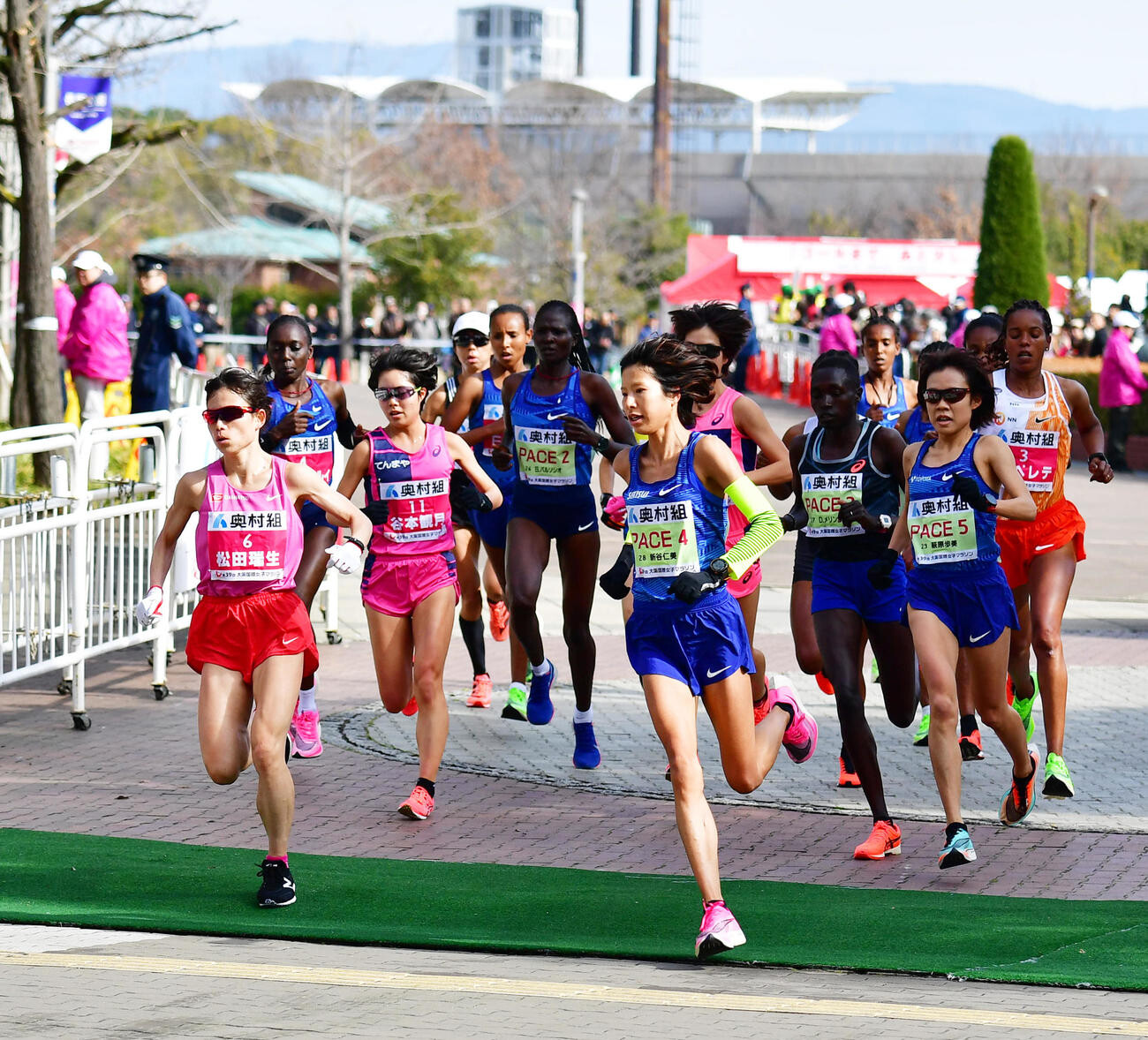
Both women went on to contest two marathons in 2022. Chepkemoi won in Enschede in 2:21:10 and then ran 2:25:12 in Berlin, but finished outside the top 10. Hailu, meanwhile, won in Rotterdam in 2:22:01 but then failed to finish in Chicago.
So this race will be a chance for redemption after both women had somewhat frustrating performances in their big city races at the end of last year. If Chepkemoi wins, she will be the first Kenyan winner of this race since Catherine Ndereba claimed victory back in 2006.
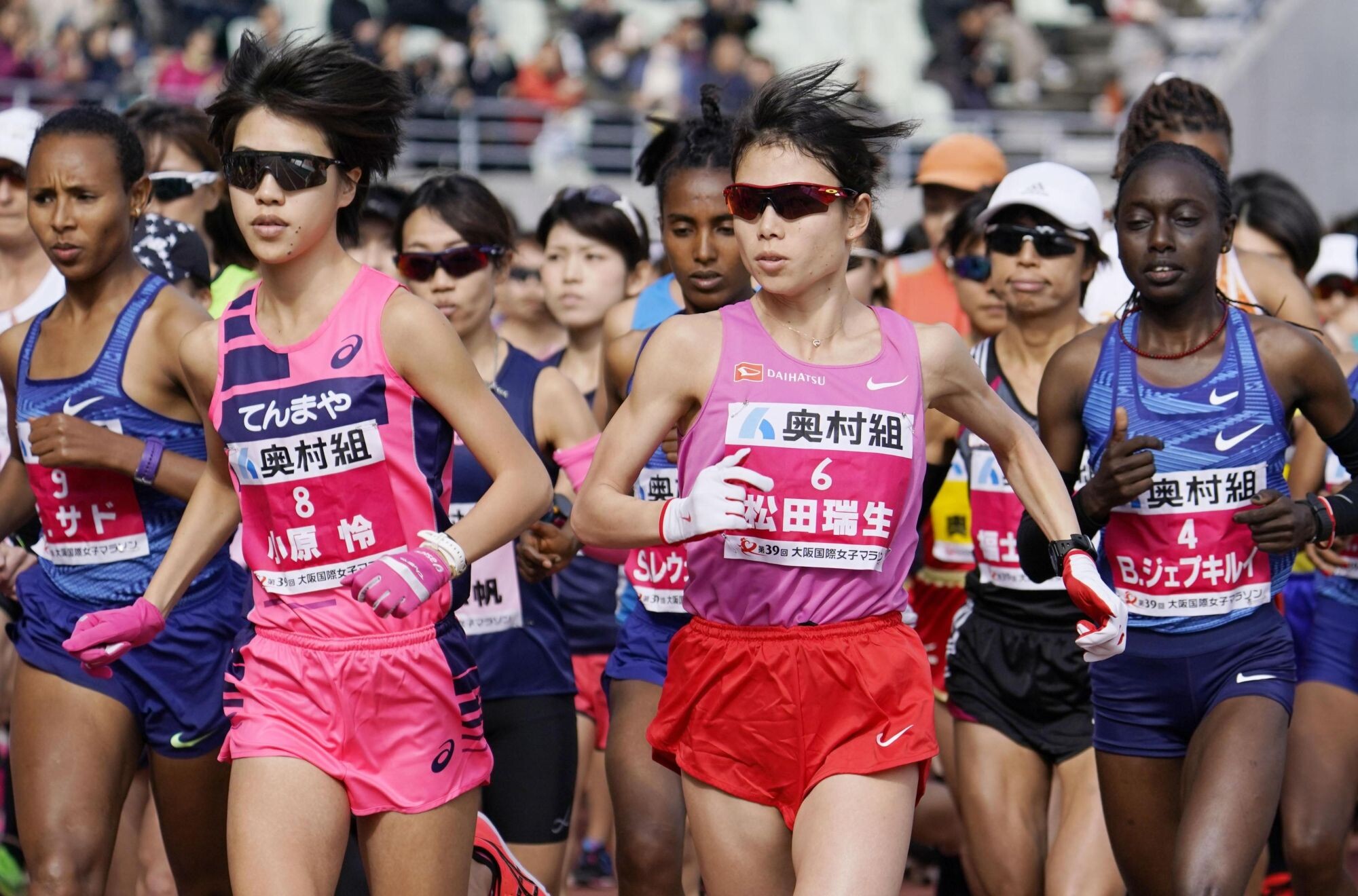
But Gola, Hailu’s fellow Ethiopian, should also be in contention for victory. A consistent performer, she has finished runner-up in four of her past six marathons. She set a PB of 2:20:50 when finishing second in Seville last year, and came close to matching that in Berlin seven months later with a 2:20:58 clocking to place fifth, comfortably ahead of Chepkemoi.
There is, as always, a strong contingent of Japanese runners in the field. For many, the focus will be on qualifying for the Marathon Grand Championship – Japan’s Olympic trial race – in October later this year. To earn a place in that race, the top three Japanese women must finish inside 2:28. Alternatively, if the first six Japanese women finish inside 2:27, they will qualify. Or if anyone places outside the top six Japanese finishers but still runs inside 2:24, they too will qualify.
Yuka Ando is the fastest Japanese woman in the field with her 2:21:36 PB from her marathon debut in 2017. A former third-place finisher in Osaka (2018), Ando achieved podium finishes in Nagoya in 2022 and 2020, finishing inside 2:23 on both occasions.
Sayaka Sato and Mao Uesugi should also be among the leading Japanese contenders. Sato finished sixth in Osaka last year, then went on to achieve a top-10 finish in Berlin, setting a PB of 2:22:13.
Uesugi, meanwhile, will be aiming to continue her progression in Osaka. She just missed the podium in 2021 but set a PB of 2:24:52. She then improved to runner-up last year, setting another lifetime best (2:22:29).
Organisers have made a few changes to the course for this year, which they say is just as fast as the old one, although there appears to be a few more inclines than before. The existing course record is 2:20:52, set last year by Mizuki Matsuda.
Elite field
Maurine Chepkemoi (KEN) 2:20:18
Haven Hailu (ETH) 2:20:19
Meseret Gola (ETH) 2:20:50
Yuka Ando (JPN) 2:21:36
Sayaka Sato (JPN) 2:22:13
Mao Uesugi (JPN) 2:22:29
Reia Iwade (JPN) 2:23:52
Sairi Maeda (JPN) 2:25:25
Haruka Yamaguchi (JPN) 2:26:35
Chiharu Ikeda (JPN) 2:26:50
Risper Gesabwa (MEX) 2:26:55
Munkhzaya Bayartsogt (MGL) 2:28:03
Shiho Kaneshige (JPN) 2:28:51
Alice Wright (GBR) 2:29:08
Sakiho Tsutsui (JPN) debut
Yumi Yoshikawa (JPN) debut.
by World Athletics
Login to leave a comment
Osaka International Womens Marathon
The Osaka International Ladies Marathon is an annual marathon road race for women over the classic distance of 42.195 kilometres which is held on the 4th or 5th Sunday of January in the city of Osaka, Japan, and hosted by Japan Association of Athletics Federations, Kansai Telecasting Corporation, the Sankei Shimbun, Sankei Sports, Radio Osaka and Osaka City. The first...
more...Matsuda runs 2:20:52 to break Osaka Women's Marathon record
Mizuki Matsuda broke the race record at the Osaka Women’s Marathon on Sunday (30), improving her PB to 2:20:52 to win the World Athletics Elite Label event.
Her time beats the 2:21:11 event record which had been set by Mao Ichiyama last year and moves her to fifth on the Japanese all-time list. It is also the second-fastest time by a Japanese athlete in Japan, behind Ichiyama’s 2:20:29 set in Nagoya in 2020.
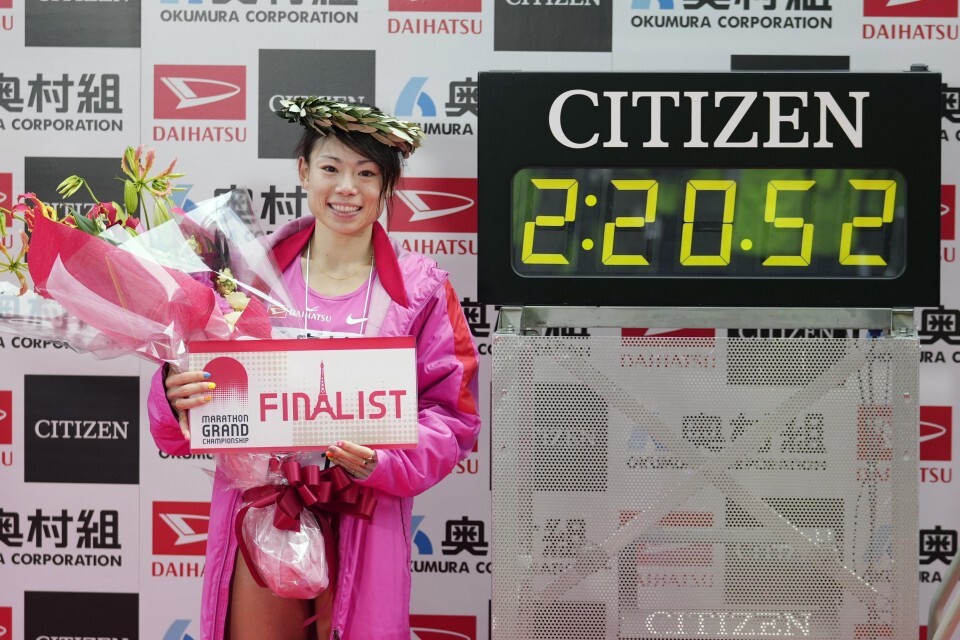
Matsuda was followed over the finish line by Mao Uesugi, Natsumi Matsushita and Mizuki Tanimoto, as the top four all dipped under 2:24.
Before the race, Matsuda had explained how her goal was to win the race with a performance that would help her to secure a spot on the team for the World Athletics Championships in Oregon later this year. After winning in Osaka in 2020 with 2:21:47, Matsuda had later missed out on a place at the Tokyo Olympics when Ichiyama ran faster in Nagoya.
“I could not attain my goal today,” she said after the race, with beating Ichiyama’s 2:20:29 a likely aim. “I am happy that my hard training paid off well.
“I think the result was good because I ran aggressively from the start. I just hope that I will be selected for the World Championships team. During the race, I was imagining myself running in Eugene, thinking: ‘How would the world-class runner run at this stage of the race?’”
Despite the pandemic, the event in Osaka was able to go ahead as planned, under good conditions with little of the expected wind.
Matsuda and Uesugi had run together behind the three male pacemakers until just after 25km, passing 10km in 33:02 and half way in 1:09:57 – a half marathon PB for Uesugi.
At 25km the clock read 1:22:47, but Uesugi started to drift back a short while later and by 30km – passed in 1:39:15 – Matsuda had built a 31-second lead.
She went through 35km in 1:56:04 and 40km in 2:13:23, with the pacemakers leaving the race as they entered Nagai Stadium park at around 41km.
Matsuda went on to cross the finish line in 2:20:52 to achieve her third Osaka Women’s Marathon win after her victories in 2018 and 2020, maintaining her unbeaten record in the event.
Although Uesugi’s pace began to slow as she was dropped, she held on to run a big PB of 2:22:29, while Matsushita was third in 2:23:05 and Tanimoto fourth in 2:23:11. Yukari Abe was fifth in 2:24:02 as the top five all set PBs, with Sayaka Sato sixth in 2:24:47. The top six all qualified for the Marathon Grand Championship, the 2024 Olympic trial race.
Login to leave a comment
Osaka International Womens Marathon
The Osaka International Ladies Marathon is an annual marathon road race for women over the classic distance of 42.195 kilometres which is held on the 4th or 5th Sunday of January in the city of Osaka, Japan, and hosted by Japan Association of Athletics Federations, Kansai Telecasting Corporation, the Sankei Shimbun, Sankei Sports, Radio Osaka and Osaka City. The first...
more...This weekend's Osaka International Women's Marathon will go ahead despide omicron wave
Despite Osaka being named to a preliminary state of emergency as Japan goes deeper into its omicron wave, this weekend's Osaka International Women's Marathon and Osaka Half Marathon are going ahead on their traditional public road courses. Osaka Women's is Japan's last remaining purely elite marathon, and with the mass-participation Osaka Marathon moving to the last weekend of February this year and targeting WA platinum label status the writing has to be on the wall for its future.
It just doesn't seem sustainable to have this race four weeks before the start of a three-week run of platinum label races, one in the same city, one in Tokyo and one in Nagoya.
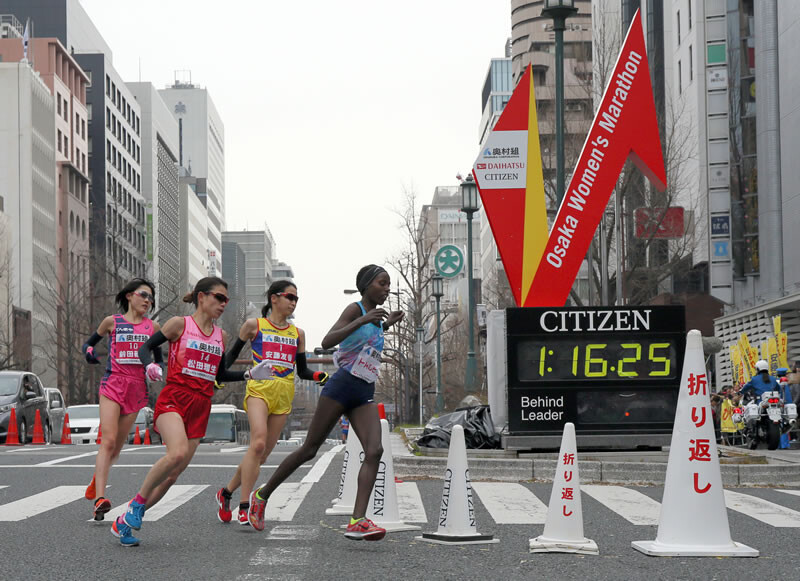
But for this year, at least, Osaka Women's clearly has the support up top in the local government to keep moving, and that counts for something. Like the 2021 race, despite its name it's a Japanese-only field with male pacers, kind of inevitably on the first point given Japan's ongoing border fortification but a bit regrettably on the second. Take out the "International" and "Women's" and what have you got left?
The win looks almost definitely to be between Mizuki Matsuda (Daihatsu) and Sayaka Sato (Sekisui Kagaku). Matsuda has one of the best records in the sport, with three wins and a 5th-place in Berlin out of five marathon starts, all between 2:21:47 and 2:22:44. The only misfire she's had was a 2:29:51 for 4th in Japan's Olympic marathon trials that left her as alternate. How she would have done if she'd replaced one of the less-than-100% women who ran the Olympics is one of last year's biggest what-ifs. Sato was the 4th-fastest Japanese woman in 2020 and 2021 and set the 25 km NR en route in her marathon debut, a mark that Matsuda broke while winning Nagoya last year. Sato will need a big step up and/or another miss from Matsuda to compete, but it should be a good race.
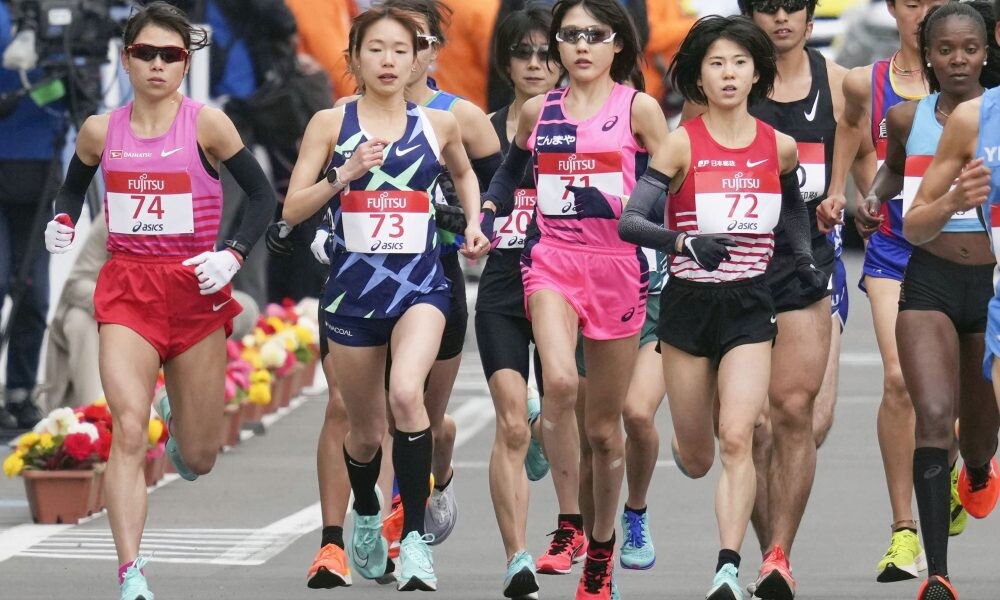
The supporting cast includes 2019's fastest Japanese woman Reia Iwade (Adidas), and 2021's 3rd and 4th-placers Yukari Abe (Shimamura) and Mao Uesugi (Starts). Osaka Women's factors into the complex algorithms for making the Oregon World Championships team and Paris Olympics marathon trials, and with six other women in the field having run under the 2:27:00 B-standard for qualification for the Olympic trials the race to finish in the 4th-6th place B-standard bracket should be just as good as the one to make the 1st-3rd place A-standard bracket.
Alongside the marathon, the Osaka Half Marathon will also feature two-time Osaka International winner Kayoko Fukushi (Wacoal) in her final race. Fukushi's marathon debut in Osaka in 2008 was possibly the wildest elite-level marathon debut in history, and while she might not have another marathon in her it's great to see her bring her career to a close back where she had one of its most unforgettable highlights. Sub-61 half marathoner Kenta Murayama (Asahi Kasei) leads the men's field in the half in a tune-up for one of the big marathons a month away whose future is still up in the air.
Fuji TV is handling TV broadcasting duties starting at noon Sunday Japan time. Official streaming looks to be through the TVer subscription service, so get your VPNs now. You might have luck with mov3.co too, but use a popup blocker. JRN will also be covering the race on @JRNlive.
by Brett Larner
Login to leave a comment
Osaka International Womens Marathon
The Osaka International Ladies Marathon is an annual marathon road race for women over the classic distance of 42.195 kilometres which is held on the 4th or 5th Sunday of January in the city of Osaka, Japan, and hosted by Japan Association of Athletics Federations, Kansai Telecasting Corporation, the Sankei Shimbun, Sankei Sports, Radio Osaka and Osaka City. The first...
more...2022 Strong Elite Field for Osaka International Women's Marathon
The organizers of next month's Osaka International Women's Marathon have announced the invited field of 43 for Japan's last remaining purely elite marathon. Like the 2021 race, despite the event's name it's a Japanese-only field with male pacers, kind of inevitably on the first point given Japan's ongoing border fortification but a bit regrettably on the second.
For a domestic field it's pretty good, all 17 of the women in it who've run under 2:35 in the last three years having done it either here or in Nagoya. 2020 winner and unlucky Olympic alternate Mizuki Matsuda (Daihatsu) is the favorite, with support from Sayaka Sato (Sekisui Kagaku), the 4th-fastest Japanese woman in 2020 and 2021, 2019's fastest Reia Iwade (Adidas), and 2021's 3rd and 4th-placers Yukari Abe (Shimamura) and Mao Uesugi (Starts).
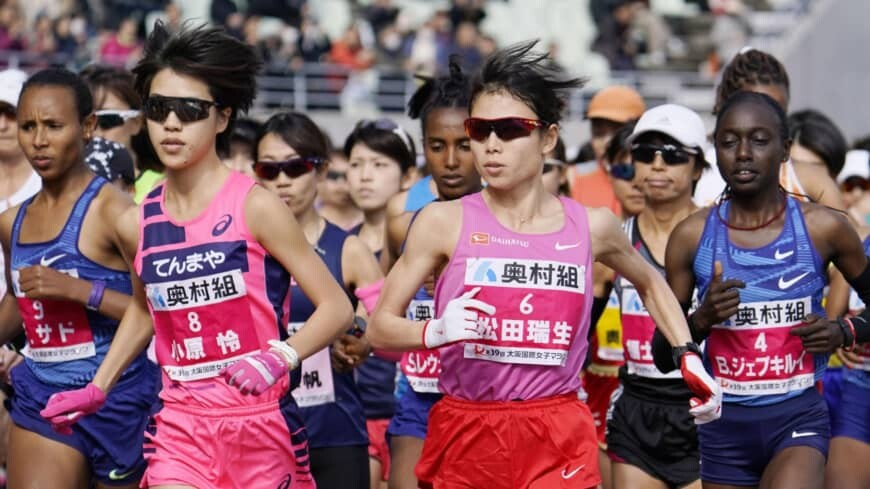
Six other women in the field have run under the 2:27:00 B-standard for qualification for the 2024 Olympic marathon trials, including current JMC Series I leader Haruka Yamaguchi (AC Kita), so with the qualifying window now open the race to finish in the 4th-6th place B-standard bracket should be just as good as the one to make the 1st-3rd place A-standard bracket.
Alongside the marathon, the Osaka Half Marathon will also feature two-time Osaka International winner Kayoko Fukushi (Wacoal) in her final race.
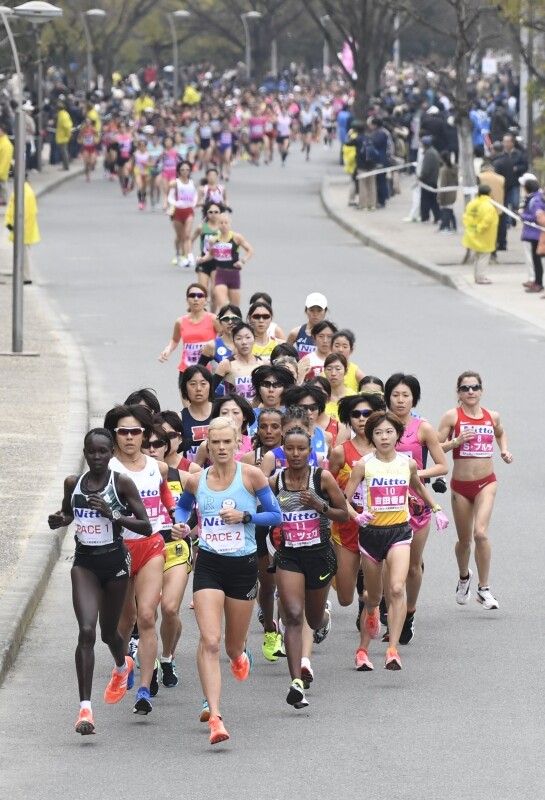
Check back closer to race date for options on streaming and following the race live.
41st Osaka International Women's Marathon.
- Mizuki Matsuda (Daihatsu) - 2:21:47 (1st, Osaka Int'l 2020)
- Sayaka Sato (Seiksui Kagaku) - 2:23:27 (5th, Nagoya Women's 2020)
- Reia Iwade (Adidas) - 2:23:52 (5th, Nagoya Women's 2019)
- Yukari Abe (Shimamura) - 2:24:41 (3rd, Osaka Int'l 2021)
- Mao Uesugi (Starts) - 2:24:52 (4th, Osaka Int'l 2021)
- Mizuki Tanimoto (Tenmaya) - 2:25:28 (11th, Nagoya Women's 2019)
- Ayano Ikemitsu (Kagoshima Ginko) - 2:26:07 (12th, Nagoya Women's 2019)
- Ayumi Hagiwara (Toyota Jidoshokki) - 2:26:15 (5th, Oaka Int'l 2021)
- Natsumi Matsushita (Tenmaya) - 2:26:26 (3rd, Nagoya Women's 2021)
- Haruka Yamaguchi (AC Kita) - 2:26:35 (7th, Osaka Int'l 2020)
- Hanae Tanaka (Daiichi Seimei) - 2:26:49 (5th, Nagoya Women's 2021)
- Misaki Kato (Kyudenko) - 2:27:20 (8th, Nagoya Women's 2021)
- Madoka Nakano (Iwatani Sangyo) - 2:27:39 (4th, Osaka Int'l 2019)
- Shiho Kaneshige (GRlab Kanto) - 2:28:51 (16th, Osaka Int'l 2020)
- Anna Matsuda (Denso) - 2:29:52 (8th, Osaka Int'l 2021)
- Rie Kawauchi (Otsuka Seiyaku) - 2:31:34 (17th, Nagoya Women's 2021)
- Ayano Ikeuchi (Denso) - 2:33:29 (19th, Nagoya Women's 2021)
- Mai Fujisawa (Hokkaido Excel AC) - 2:35:52 (1st, Kanazawa 2021)
- Asuka Yamamoto (Edion) - 2:36:14 (21th, Osaka Int'l 2020)
- Tomomi Sawahata (Sawahatas) - 2:37:02 (1st, Gunma 2021)
- Mai Ito (Otsuka Seiyaku) - 2:38:07 (25th, Nagoya Women's 2021)
- Michi Numata (Toyota Jidoshokki) - 2:38:30 (39th, Nagoya Women's 2019)
- Saki Tokoro (Kyocera) - 2:38:49 (40th, Nagoya Women's 2019)
- Mitsuko Ino (Linkstyle) - 2:39:04 (10th, Osaka 2019).
by Brett Larner
Login to leave a comment
Osaka International Womens Marathon
The Osaka International Ladies Marathon is an annual marathon road race for women over the classic distance of 42.195 kilometres which is held on the 4th or 5th Sunday of January in the city of Osaka, Japan, and hosted by Japan Association of Athletics Federations, Kansai Telecasting Corporation, the Sankei Shimbun, Sankei Sports, Radio Osaka and Osaka City. The first...
more...Japanese woman Mariko Yugeta, sets W60 world record with 2:52 marathon in Osaka
Sunday’s Osaka Women’s Marathon in Japan saw many fast results, including a course record and world-leading time from Mao Ichiyama, who won the race in 2:21:11. Ichiyama’s win was not the biggest story of the day, however, as she and the rest of the field were overshadowed by Mariko Yugeta, a 62-year-old woman who posted an age group world record of 2:52:13.
Yugeta’s time was good enough for 48th place, and it smashed the previous W60 world record of 2:56:54, which she set in 2019.
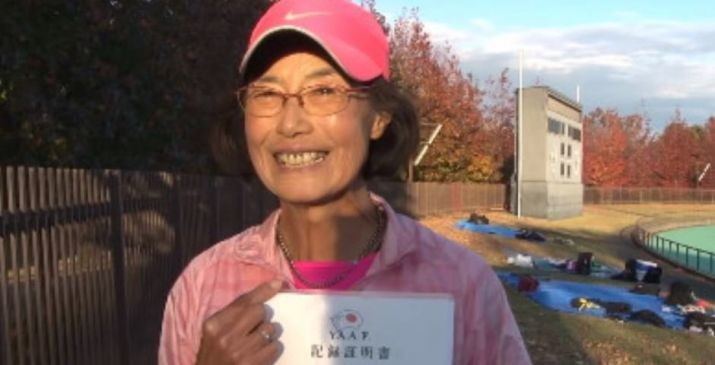
Not only is this a world record for Yugeta, but it’s also a personal best. That’s right — she’s 62 years old and beating times she set years ago. Since joining the W60 age group, Yugeta has broken the marathon world record three times. Her first record run came in November 2019, when she became the first W60 runner to break three hours in the marathon. She ran 2:59:15 at the Shimonoseki Kaikyo Marathon in Japan, shattering the previous world record of 3:02:50 that France’s Claudine Marchadier set in 2007.
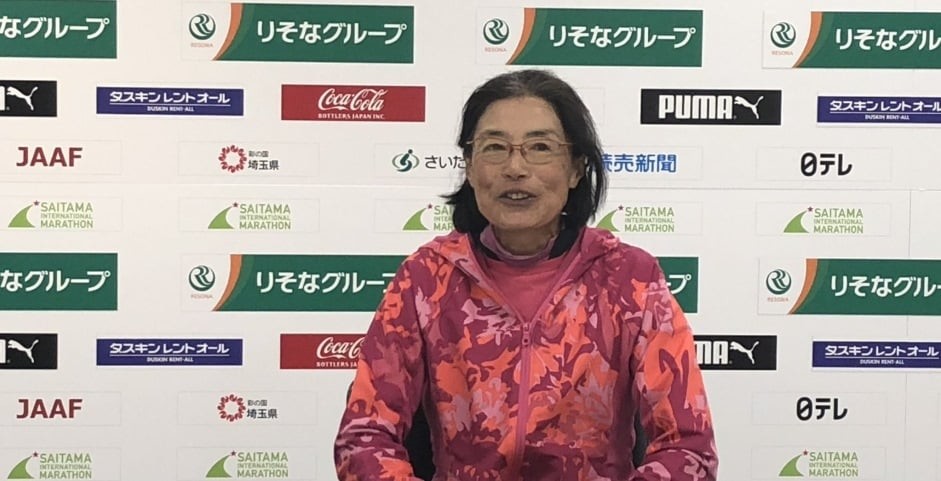
Yugeta´s next record-breaking run came just one month after her initial sub-three-hour result, this time at Japan’s Saitama International Marathon. Despite having run a marathon weeks earlier, she managed to lower her own record even more, finishing in 18th place in 2:56:54. She failed to break her record in 2020, but she did post another sub-three-hour result, running the Osaka Women’s Marathon in 2:59:23. Finally, Yugeta ran her current PB of 2:52:13 on Sunday, but she isn’t satisfied just yet.
As reported by Japan Running News (JRN), Yugeta is registered for the Nagoya Women’s Marathon, which is set for March 14, and she says she will be looking to run even quicker than she did in Osaka. “I want to keep my legs in perfect condition and go for 2:50 or 2:51,” she said.
This might seem too ambitious, but as the JRN article notes, Yugeta struggled in the final weeks of her build to the Osaka Women’s marathon. She reportedly dealt with fatigue (which is understandable, as she runs incredibly high mileage, hitting 800K per month in the summers) and pain in her glutes. Fortunately, she was able to remedy this discomfort through acupuncture treatments, and she said her run in Osaka was pain-free.
Still, even though she felt fine on race day doesn’t mean the ghosts of those nagging issues weren’t affecting her. With those problems behind her, she could have a better build ahead of the Nagoya Women’s Marathon, which could mean the W60 world record will be lowered once again.
by Ben Snider-McGrath
Login to leave a comment
Osaka International Womens Marathon
The Osaka International Ladies Marathon is an annual marathon road race for women over the classic distance of 42.195 kilometres which is held on the 4th or 5th Sunday of January in the city of Osaka, Japan, and hosted by Japan Association of Athletics Federations, Kansai Telecasting Corporation, the Sankei Shimbun, Sankei Sports, Radio Osaka and Osaka City. The first...
more...Tokyo Olympians finish 1, 2 in Osaka Women's Marathon
Japan Olympic team member Mao Ichiyama won the Osaka Women's Marathon in a race record 2 hours, 21 minutes, 11 seconds on Sunday, finishing ahead of fellow Tokyo Olympian Honami Maeda.
Organizers moved this year's race off public streets due to the coronavirus pandemic, rerouting it to 14-plus laps of a 2.8-kilometer circuit around Osaka's Nagai Park, finishing inside Yanmar Stadium Nagai.
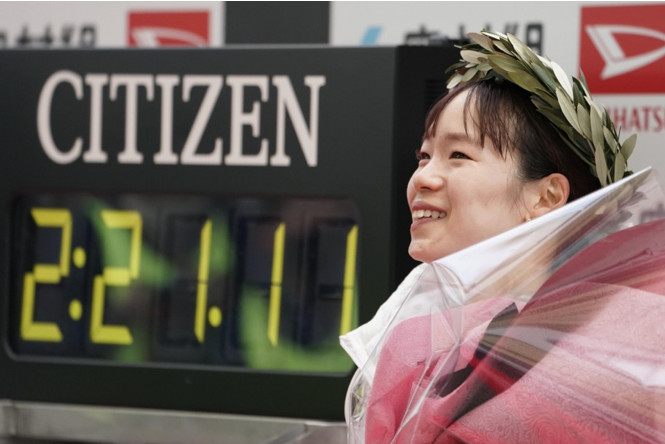
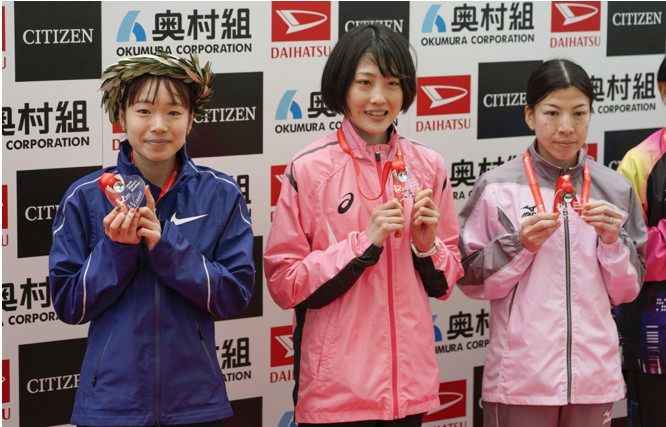
Ichiyama's time was about two minutes shy of the Japan women's record of 2:19:12 run by 2004 Olympic champion Mizuki Noguchi at the September 2005 Berlin Marathon.
Both Ichiyama and Maeda entered the race aiming to break Noguchi's record, but Maeda fell off the pace early on, while Ichiyama's pace slackened around the halfway point.
Ichiyama did break Noguchi's meet record of 2:21:18 from 2003, while Maeda still managed a personal best of 2:23:30.
Login to leave a comment
Osaka International Womens Marathon
The Osaka International Ladies Marathon is an annual marathon road race for women over the classic distance of 42.195 kilometres which is held on the 4th or 5th Sunday of January in the city of Osaka, Japan, and hosted by Japan Association of Athletics Federations, Kansai Telecasting Corporation, the Sankei Shimbun, Sankei Sports, Radio Osaka and Osaka City. The first...
more...Osaka Women´s Marathon is focused just on Japanese elite runners
Due to increasing infection rates in Japan the number of participants in the 40th Osaka Women’s Marathon on 31 January has been limited to 99 and the traditional course through the city changed to a 2.8km lap (x 15) in Nagai Park followed by the finish in the Yanmar Nagai Stadium.
For the same reasons foreign athletes have not been invited and the focus is entirely on the Japanese elite.
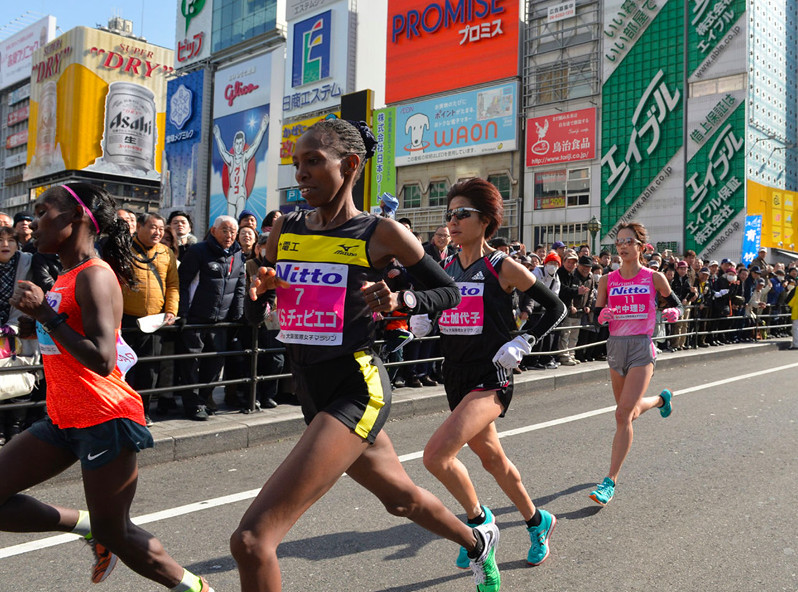
Among those running are Mao Ichiyama (JPN) and Honami Maeda (JPN), who have already qualified for their country’s Olympic team at the Marathon Grand Championships. Ichiyama won the Nagoya marathon in 2:20:29 last year, while Maeda won the Olympic qualification in 2:25:15 in September 2019.
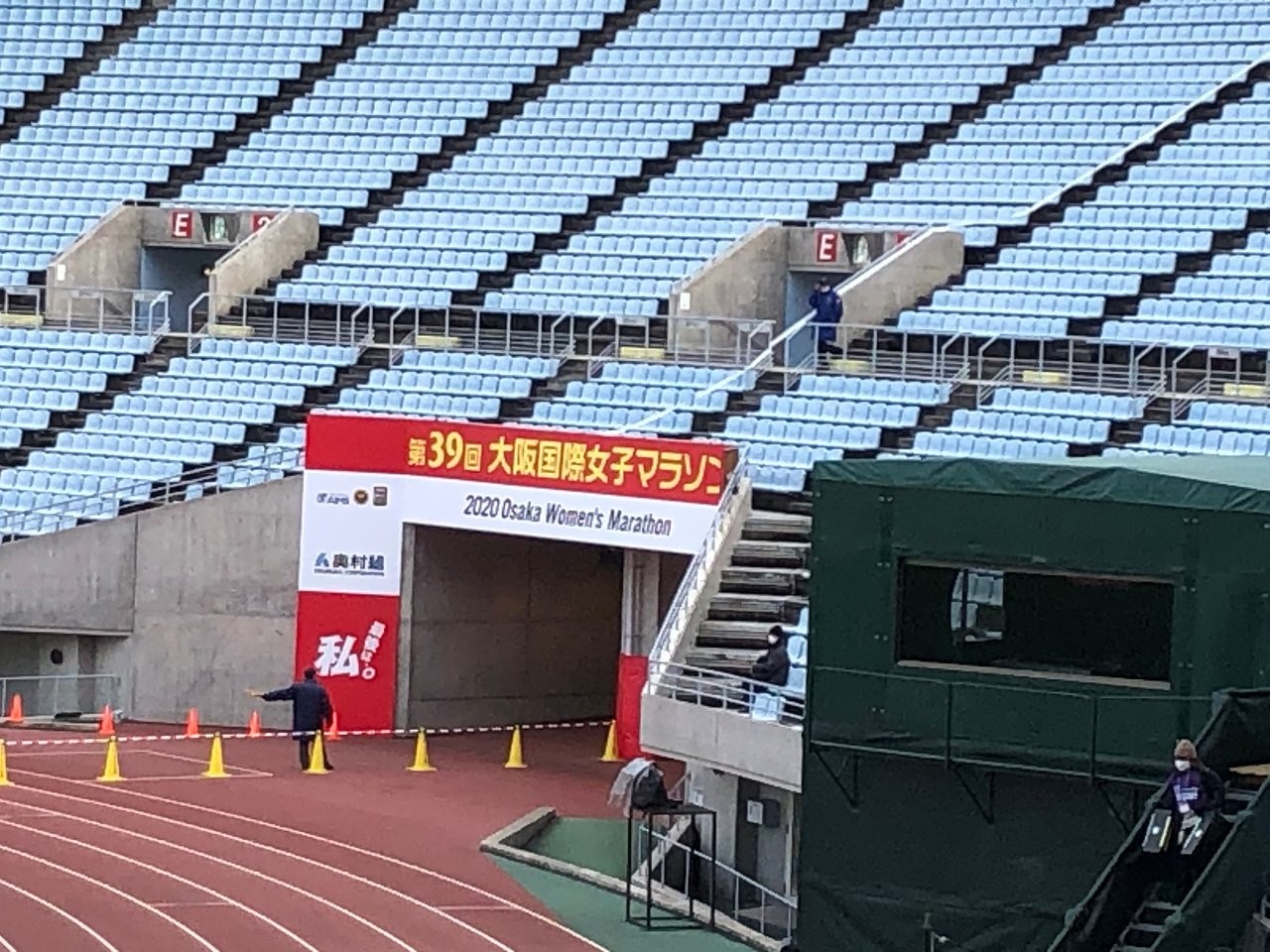
Her best time of 2:23:48 was second in Osaka in 2018, and in the same year she was seventh in 2:25:23 in the Berlin Marathon.
The organizers plan to attack the national record for the women’s marathon of 2:19:12 (set by Mizuki Noguchi at the 2005 Berlin Marathon). The two top runners, in another departure from tradition, will be paced by a total of six men, including the unattached runner Yuki Kawauchi (JPN) and Juji Iwata (JPN).
With personal bests of 2:08:14 and 2:08:45 respectively they are likely to maintain pacing duties until shortly before the stadium entrance.
by Helmut Winter
Login to leave a comment
Osaka International Womens Marathon
The Osaka International Ladies Marathon is an annual marathon road race for women over the classic distance of 42.195 kilometres which is held on the 4th or 5th Sunday of January in the city of Osaka, Japan, and hosted by Japan Association of Athletics Federations, Kansai Telecasting Corporation, the Sankei Shimbun, Sankei Sports, Radio Osaka and Osaka City. The first...
more...Osaka Women's Marathon will be Run on 2.8 km Loop Inside Nagai Park
On Jan. 17 it was learned that the Jan. 31 Osaka International Women's Marathon will be run on a multi-lap loop course inside Nagai Park. Some of the athletes scheduled to run were notified last week of the likelihood of the change from Osaka's traditional road course, a change made as a result of the continued spread of the coronavirus.
It is the first time the race will be run on a circuit course in the years since its first running in 1982.
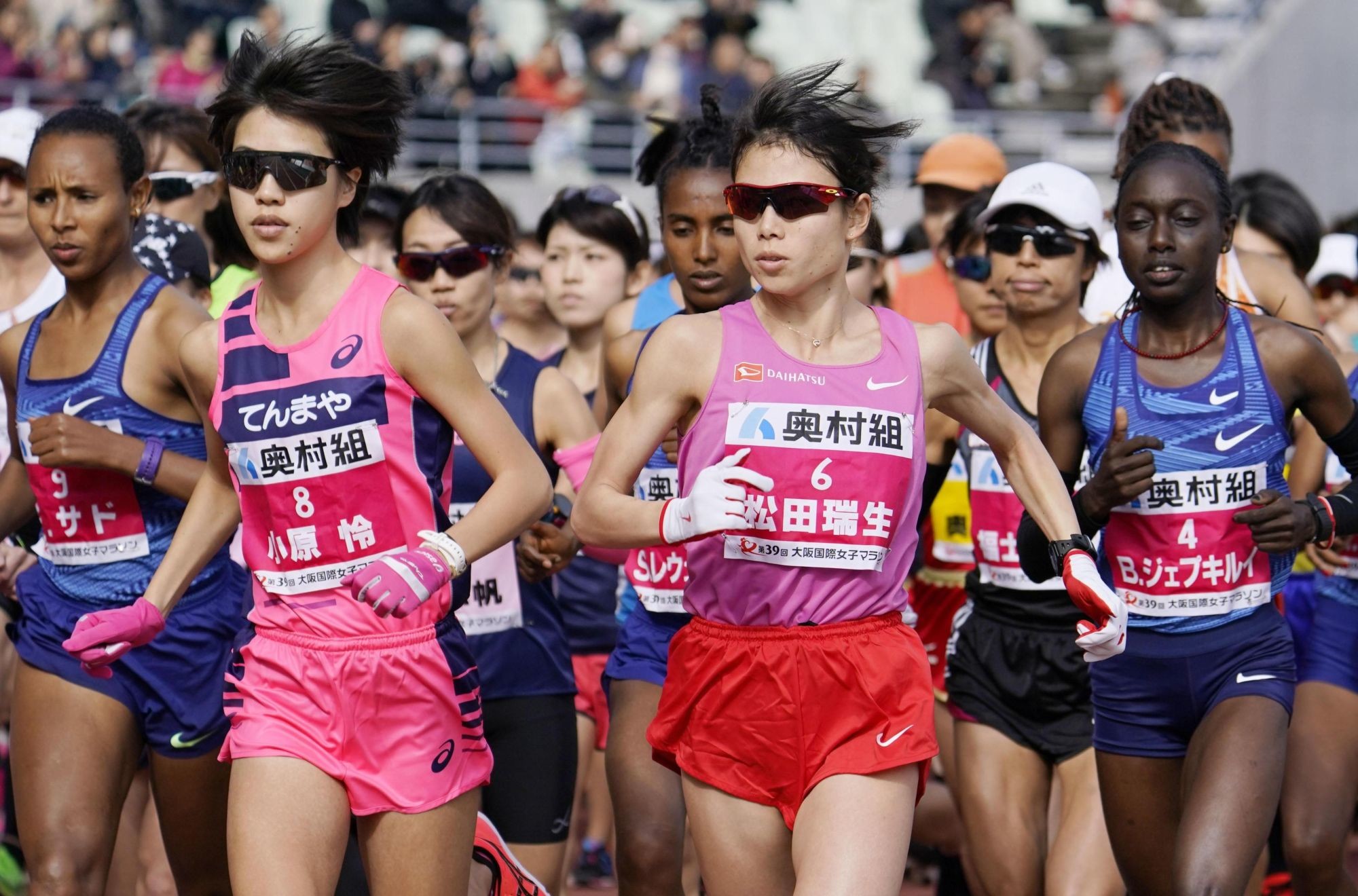
Tokyo Olympics women's marathon team members Mao Ichiyama (23, Wacoal) and Honami Maeda (24, Tenmaya) had planned to try to break the 2:19:12 national record in Osaka, but the impact of the change on times run there remains unclear at this point.
Osaka organizers have recruited male pacers, a first for a domestic women's marathon, to help chase the record, but with the government's declaration of a state of emergency last week they had no choice but to make the last-minute course change.
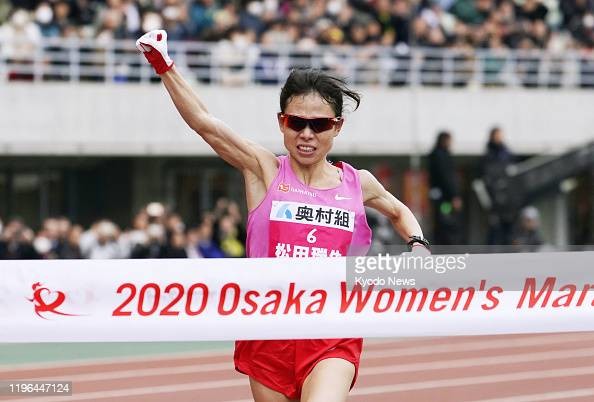
Most road races over the last year have been canceled or postponed. In the midst of those circumstances it was all but impossible for Osaka organizers to go ahead with their race as usual, and the field was cut back to just 99 athletes, about a fifth the usual number.
Despite calls for the public to stay home and watch the race on TV, it was inevitable that some fans would turn up along the course, and the logistics of the race's usual format meant the need for a large number of operations personnel for duties like traffic control and drink stations. Many of those tend to be elderly people.
The change to a circuit course helped to significantly reduce the number of people needed, mitigating the risk of spreading the virus.
Over the last few months a number of other races have been held inside parks instead of on public roads. October's Hakone Ekiden Yosenkai half marathon was held on an officially-certified 2.6 km circuit course around the runway at Tokyo's Tachikawa SDF Airbase, with 46 university teams taking part. November's East Japan Corporate Men's Ekiden likewise took place inside a park in Kumagaya, Saitama, with 24 teams covering a total of 76.4 km on a 4.2 km loop.
Amateur races have been held using loop courses along riverbanks. Overseas, October's London Marathon was held on a 2.15 km loop.
Osaka's traditional course was certified by both the JAAF and World Athletics, but it remains to be seen what the status of the new course will be. Consisting of 15 laps of a flat 2.8 km loop followed by a track finish inside Yanmar Stadium Nagai, the possibility of running a fast time looks considerable, but first the new course must be officially certified. With just half a year left until the Tokyo Olympics this will all but definitely by the last pre-Olympic marathon for both Ichiyama and Maeda, but it's hard to see this as a good simulation of racing in Sapporo.
Following the forced relocation of the Olympic marathon from Tokyo to Sapporo and the postponement of the Olympics, Osaka's course change is the latest hurdle for both women to clear in their quest to compete with the best in the world.
by Brett Larner
Login to leave a comment
Osaka International Womens Marathon
The Osaka International Ladies Marathon is an annual marathon road race for women over the classic distance of 42.195 kilometres which is held on the 4th or 5th Sunday of January in the city of Osaka, Japan, and hosted by Japan Association of Athletics Federations, Kansai Telecasting Corporation, the Sankei Shimbun, Sankei Sports, Radio Osaka and Osaka City. The first...
more...Osaka Women´s Marathon is set to go ahead despite state of emergency
Despite the pending declaration of a state of emergency in the greater Osaka area as the coronavirus continues its rapid spread, the organizers of the Jan. 31 Osaka International Women's Marathon intend to go ahead with this year's race, in which Tokyo Olympic marathon team members Mao Ichiyama (23, Wacoal) and Honami Maeda (24, Tenmaya) are entered to run.
Last year the JAAF published strict guidelines for the staging of road races amid the coronavirus pandemic. One of the requirements for holding a race is that no declaration of a state of emergency be in place.
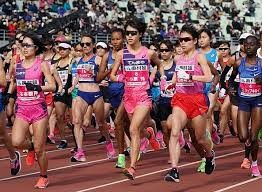
On Jan. 7 the government issued such a declaration for Tokyo and is surrounding three prefectures of Saitama, Chiba and Kanagawa. Osaka and neighboring Kyoto and Hyogo have asked to be added to that list.

If the terms of the state of emergency are the same as the earlier one for the Tokyo area, it would last until at least Feb. 7. This would put the Osaka International Women's Marathon inside the emergency period, but race organizers insist it would still be held.
The declaration would limit the number of people able to attend events, but in principle it would still be possible to stage sporting events. Osaka organizers have already announced that Nagai Stadium, the marathon's start and finish point, will not be open to the public, and have asked that people watch on TV rather than cheering courseside.
Fewer than 100 athletes are entered, and all will be required to present a negative PCR test in order to participate.
by Brett Larner
Login to leave a comment
Osaka International Womens Marathon
The Osaka International Ladies Marathon is an annual marathon road race for women over the classic distance of 42.195 kilometres which is held on the 4th or 5th Sunday of January in the city of Osaka, Japan, and hosted by Japan Association of Athletics Federations, Kansai Telecasting Corporation, the Sankei Shimbun, Sankei Sports, Radio Osaka and Osaka City. The first...
more...2021 Osaka International Women's Marathon will Be Held Jan 31 With Limited Field
On Nov. 11 the organizers of the Osaka International Women's Marathon announced that the race's 40th anniversary running will take place on Jan. 31, 2021.
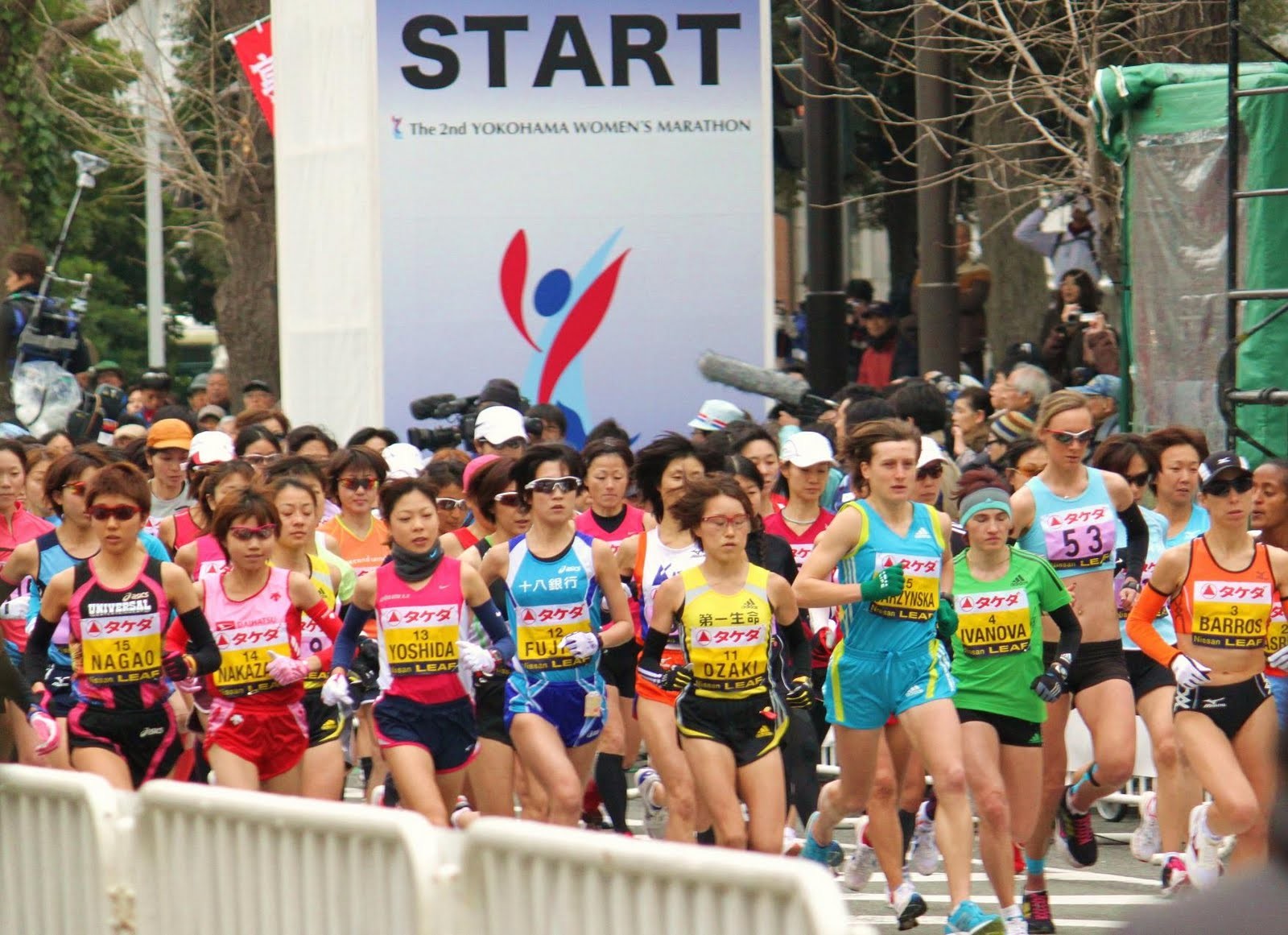
Along with strict anti-coronavirus health check requirements for all participants, the field size will be limited by tightening Osaka's usual sub-3:10 qualifying standard to sub-2:50. Fans, supporters and locals will also be asked to watch the race on TV instead of turning out to cheer courseside.
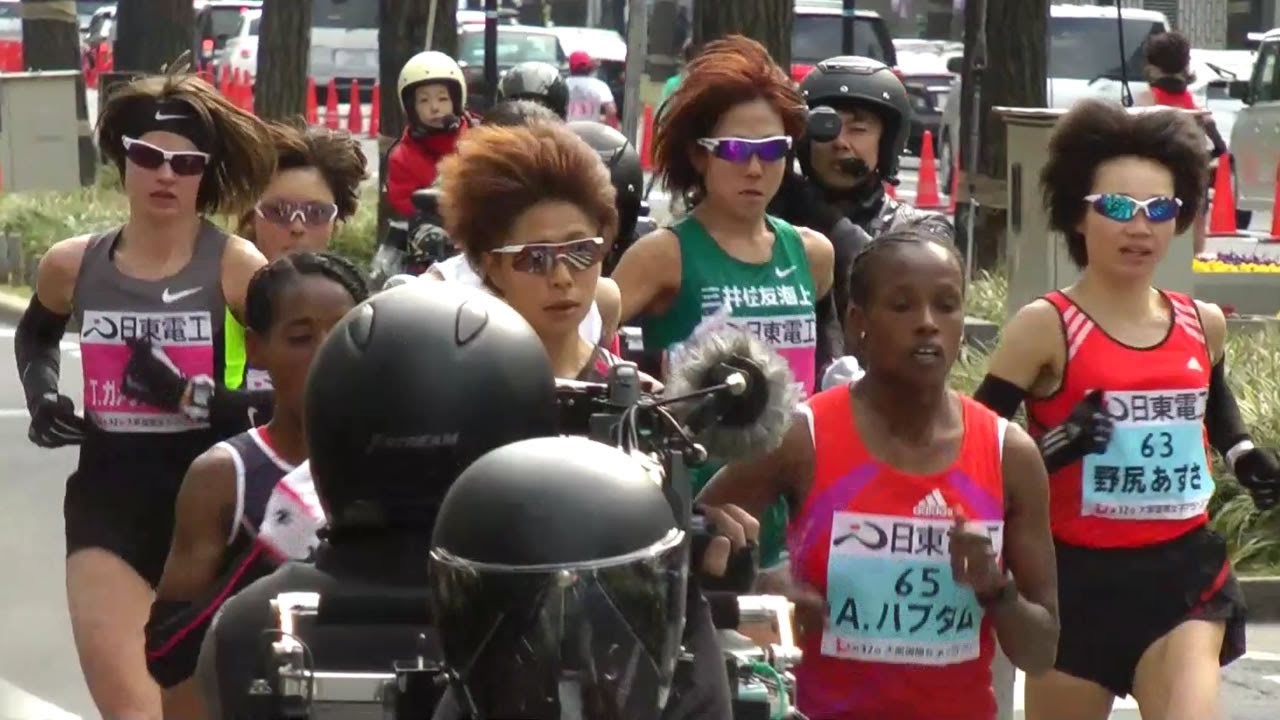
A spokesperson for the organizing committee commented, "We expect the sub-2:50 qualifying time to reduce the field size from about 500 to around 100. We had originally planned to have more runners for the race, but we hope that people can understand the necessity of these restrictions.
We hope that the race will show greater than ever unity in women's marathoning and its willingness to take on the challenges leading to the Olympics."
The domestic invited elite athlete field is scheduled to be announced in late December. The race will begin at 12:10 p.m. on Jan. 31, 2021 starting and finishing at Osaka's Yanmar Stadium Nagai. The half marathon usually staged alongside the marathon has already been canceled for 2021.
Translator's note: Although the article specifies that a domestic elite field will be announced in late December, the Japanese-language guidelines mention domestic and international elite athletes.
by Brett Larner
Login to leave a comment
Osaka International Womens Marathon
The Osaka International Ladies Marathon is an annual marathon road race for women over the classic distance of 42.195 kilometres which is held on the 4th or 5th Sunday of January in the city of Osaka, Japan, and hosted by Japan Association of Athletics Federations, Kansai Telecasting Corporation, the Sankei Shimbun, Sankei Sports, Radio Osaka and Osaka City. The first...
more...Breaking away from her final challenger after 30km, Mizuki Matsuda went on to win the Osaka Women’s Marathon in 2:21:47 on Sunday
It was the third-fastest time in the history of the Osaka Women’s Marathon and puts Matsuda sixth on the Japanese all-time list, but more importantly, she ran under the time (2:22:22) required to be considered for the third spot on the Japanese Olympic marathon team.
If no one runs faster than 2:21:47 at the Nagoya Women’s Marathon in March, Matsuda will clinch the team spot.
“I don't think anybody in Japan can run such a time,” said Matsuda, who finished fourth at last year's Marathon Grand Championship, Japan's main trial race for the Olympic Games.
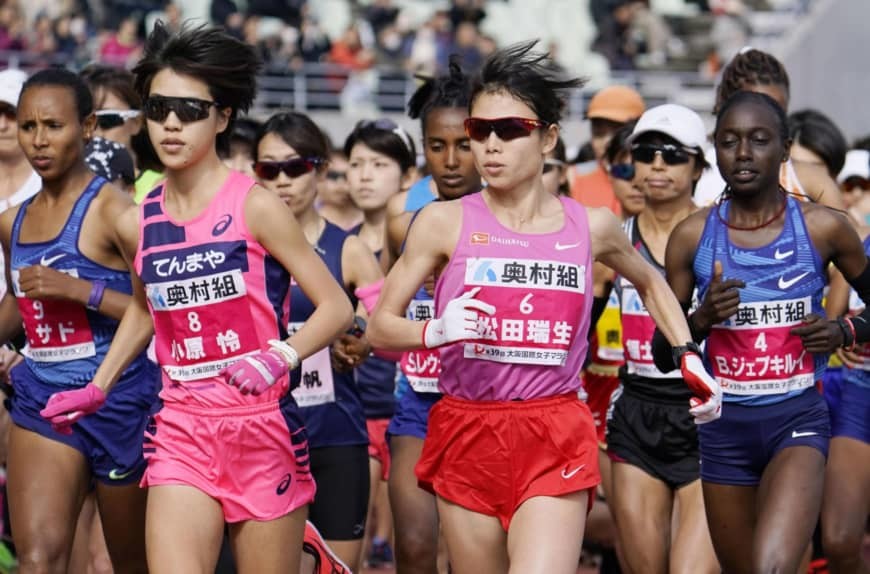
“It was not the time I was hoping for, but I had achieved the minimum requirement,” added Matsuda, who also won in Osaka in 2018. “In order to be competitive at the Olympics, I need a national-record-level personal best. I also need to work on the final part of the race because I slowed down too much at the end today.”
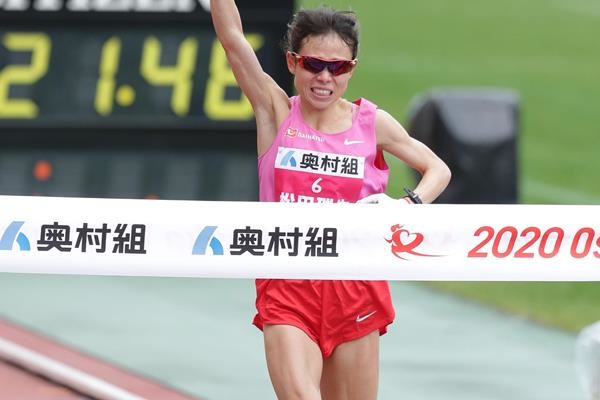
The race was fast from the start with Matsuda clocking 16:36 at 5km, 33:07 at 10km, 49:44 at 15km and 1:06:17 at 20km. “In the early part of the race I was bit worried that we were going too fast,” said Matsuda, who reached the half-way mark in 1:09:54. “It was faster than my half marathon personal best (1:10:25).”
By 25km, the lead pack consisted of Matsuda, Bahrain’s Mimi Belete and two pace-makers. “The race went well until 30km,” said Matsuda, “but then it started to get tough. Each kilometre felt very long.
“I knew four runners had faster personal bests, so I expected them to be running in front of me. When I started to run alone in front (after 30km), I looked around and asked myself, ‘where are they?’ I was running with the goal of breaking the national record (2:19:12). I had to think that way to get under 2:22.”
Immediately after the 30km check point, Matsuda checked her watch and appeared to pick up the pace for the next two kilometres. She was unable to get back on schedule for a finishing time inside 2:20, but she started to open up a gap on Belete before going on to win in 2:21:47.
Belete, who suffered from stomach problems, particularly in the latter stages, held on for second place in 2:22:40, just 78 seconds shy of the PB she set in Amsterdam three months ago.
“In my country the Olympic team spots are given to those with the fastest times,” explained Belete. “Although someone may run a faster time, I think I can be selected with the today’s time.”
Ethiopia’s Sintayehu Lewetegn finished third with 2:23:03, the second-fastest time of her career and just 18 seconds short of her personal best. Meskerem Assefa, one of the favourites, was fourth while Australian veteran Lisa Weightman was fifth in 2:26:02, the second-fastest time of her career.
Matsuda and compatriot Haruka Yamaguchi, who clocked 2:26:35 as the second Japanese finisher, were the only athletes among the top 10 to set a PB.
Last year’s runner-up Rei Ohara was suffering from a cold and achilles problems. She lost contact with the leaders after 17km and eventually finished 13th in 2:28:12.
Kayoko Fukushi, the 2013 world bronze medallist, lost contact with the leaders after 20km and dropped out after 25km. “I will start my training with running the Nagoya Women’s Marathon in mind,” said Fukushi, who is still pursuing what would be a fifth consecutive Olympic team.
by World Athletics
Login to leave a comment
Osaka International Womens Marathon
The Osaka International Ladies Marathon is an annual marathon road race for women over the classic distance of 42.195 kilometres which is held on the 4th or 5th Sunday of January in the city of Osaka, Japan, and hosted by Japan Association of Athletics Federations, Kansai Telecasting Corporation, the Sankei Shimbun, Sankei Sports, Radio Osaka and Osaka City. The first...
more...Ethiopian Haftamnesh Tesfay leads a quartet of sub-2:22 runners at the 39th edition of the Osaka Women’s Marathon
Four runners from abroad have faster personal bests than the Japanese: Ethiopians Tesfay and Meskerem Assefa, Mimi Belete of Bahrain and Kenyan Bornes Jepkirui. Tesfay ran 2:20:13 in her debut at the 2018 Dubai Marathon, at the time the fourth fastest marathon debut in history. She followed up with a 2:20:47 run in Frankfurt later that year. Assefa won the Nagoya Women’s Marathon in 2018 and later in the year finished 11 seconds ahead of Tesfay in Frankfurt with a 2:20:36 PB. Although they did not have a good 2019 season, both have sub-2:20 potential and said they are running to win on Sunday.
With a 2:21:22 performance to her credit, Mimi Belete is the third fastest in the field; more importantly, she set that at last October’s Amsterdam Marathon, clipping more than a minute from her previous best. Belete was a solid performer on the track, with 1500m and 5000m medals Asian Games medals in her collection.
Defending champion Fatuma Sado and Jepkirui, who was third last year, are back. Jepkirui improved her personal best to 2:21:26 in the 2019 Ljubljana Marathon. The last runner to win back-to-back titles was Lidia Simon who won in 1999 and 2000. Before the Romanian, Katrin Dorre also collected back-to-back victories. The German won in Osaka a record four times. Her daughter, Katharina Steinruck, a 2:27:26 marathoner, will be running this year.
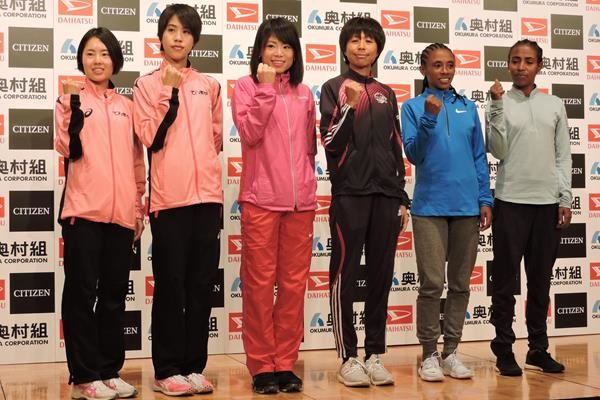
For Japanese women, it is the second to last opportunity to secure the third spot on the Olympic marathon squad. The first two finishers at September's Marathon Grand Championships (MGC) were automatically selected for the team. But third place finisher Rei Ohara, who finished four seconds behind the automatic-qualifying spot for the team, is not confirmed. Four years ago at the Nagoya Women’s Marathon, Ohara finished one second behind Tomomi Tanaka who clinched the final spot on the team bound for Rio. Thus Ohara is a sentimental favourite here, but if somebody runs faster than 2:22:22 in Osaka, or later in Nagoya, Ohara will be out.
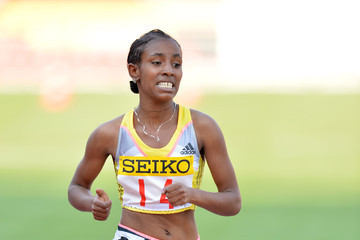
Ohara could have chosen to sit and wait, but she decided run in Osaka.
“The memory of missing the team by one second four years ago still haunts me,” Ohara said, speaking at today’s pre-race press conference. “I could have sat and waited, but I want to be a challenger. On Sunday I want to go after the team berth which eluded me at the MGC.”
That sets up the clash between Ohara, who was third in the MGC, Mizuki Matsuda, fourth in the MGC and Kayoko Fukushi, seventh in the MGC, as a potential highlight of the race. Fukushi is the fastest with a 2:22:17 personal best from the 2016 Osaka race. Matsuda is six seconds slower with 2:22:23, recorded in the 2018 Berlin Marathon.
“I have done the best training possible,” said Matsuda, who also attended today’s press conference. “I will run on Sunday as if it is the last race of my life.”
Finally, newly minted Japanese half marathon record holder Hitomi Niiya, who blitzed to a 1:06:38 victory in Houston last weekend, will run as a pacemaker.
by World Athletics
Login to leave a comment
Osaka International Womens Marathon
The Osaka International Ladies Marathon is an annual marathon road race for women over the classic distance of 42.195 kilometres which is held on the 4th or 5th Sunday of January in the city of Osaka, Japan, and hosted by Japan Association of Athletics Federations, Kansai Telecasting Corporation, the Sankei Shimbun, Sankei Sports, Radio Osaka and Osaka City. The first...
more...

